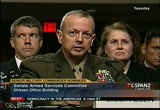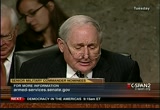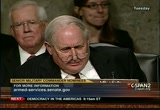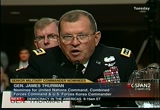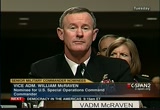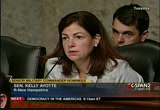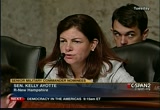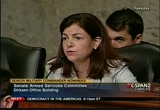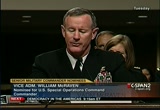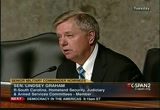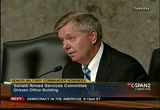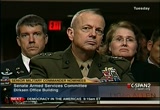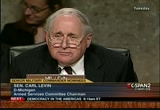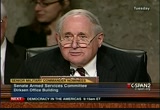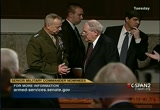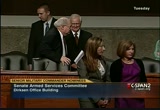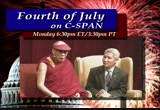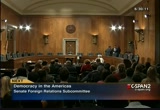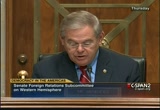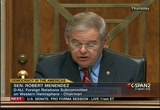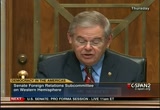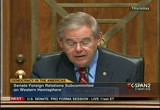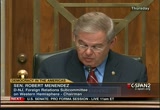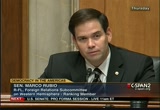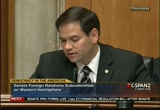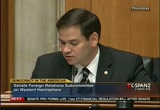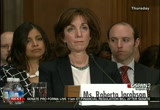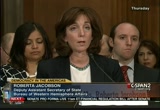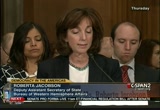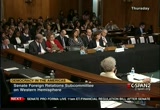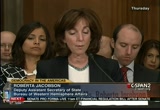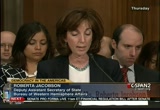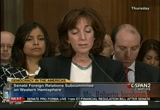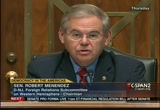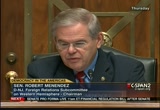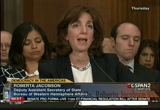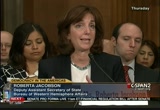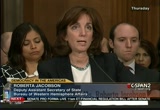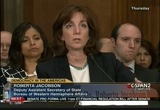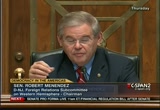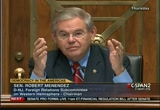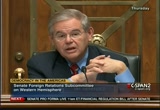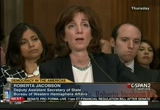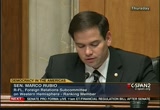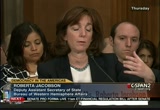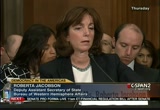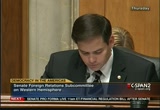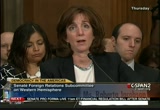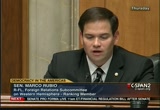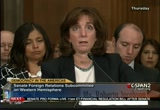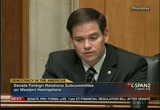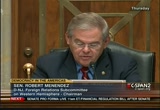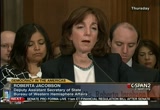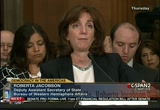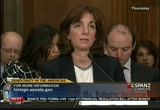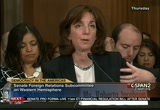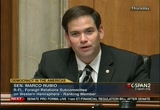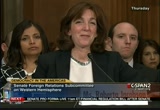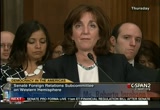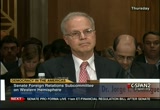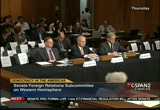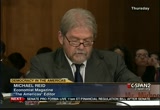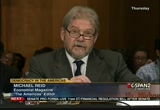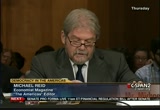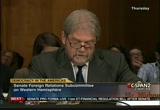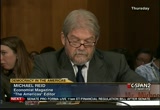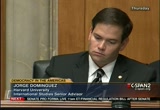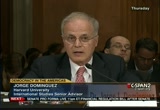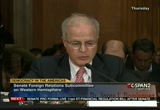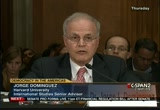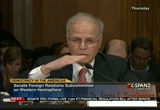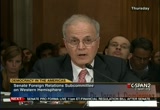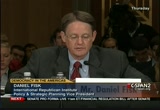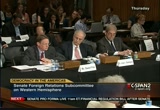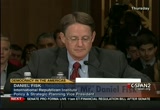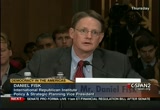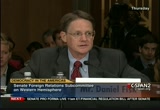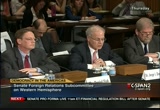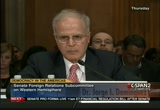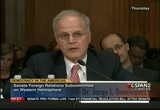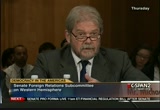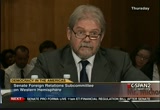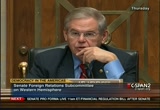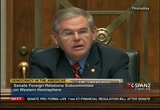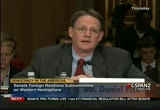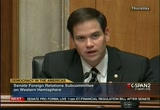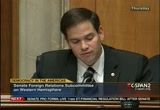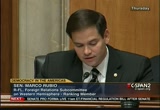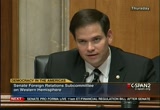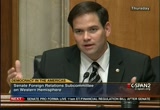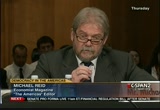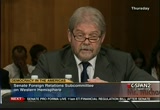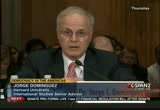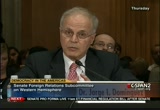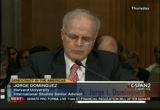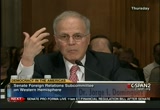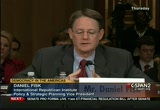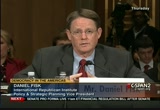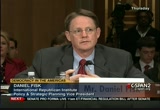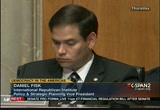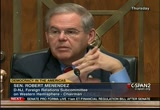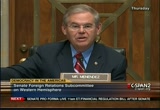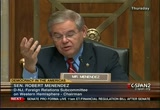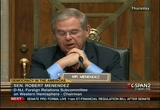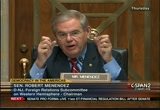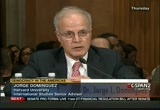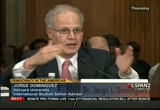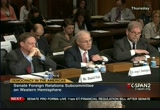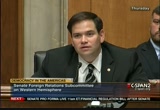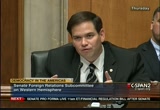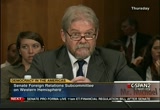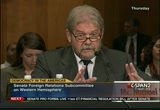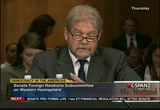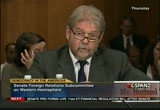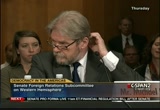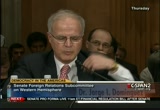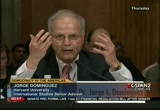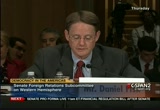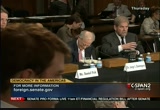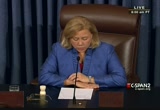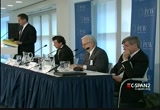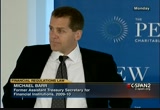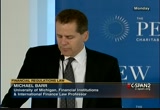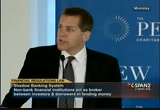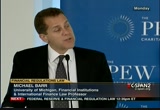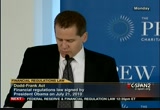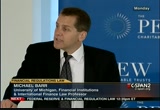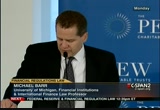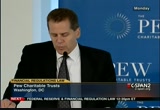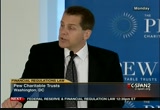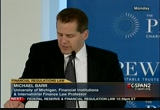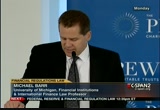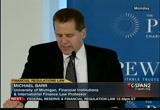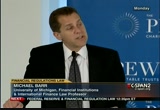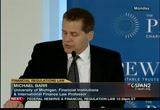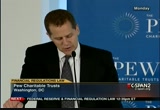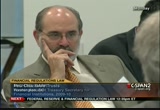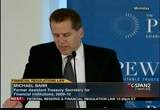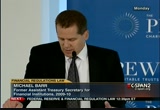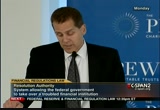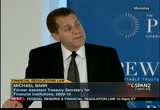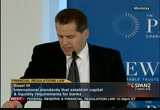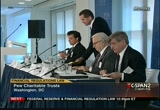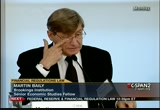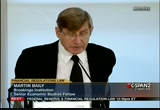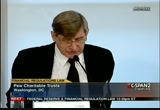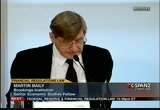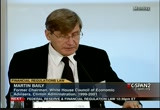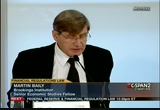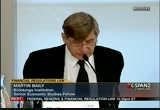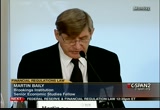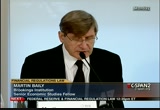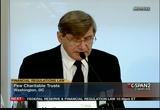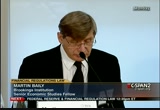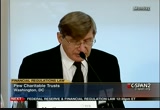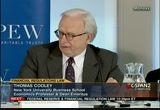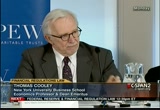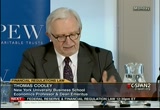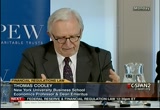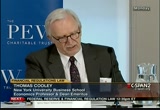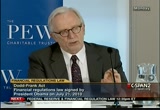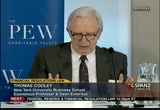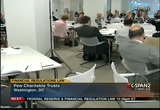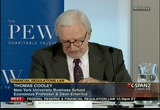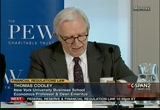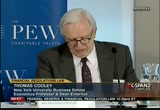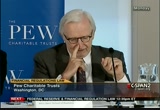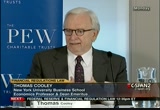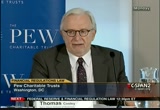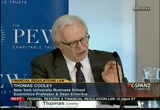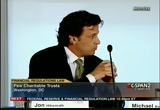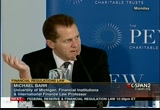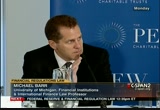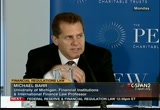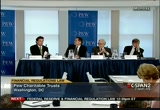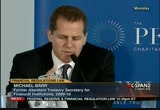tv U.S. Senate CSPAN July 1, 2011 9:00am-12:00pm EDT
9:00 am
when they first ask you, general allen about the questions of deadlines, but be aware of deadlines for previously said were supported a military commanders i believe. in iraq, back in november of 2008, president bush agreed to to deadlines for u.s. forces. one in june 2009 deadline for the withdrawal of u.s. combat forces from iraqi cities and fatcat, a december 31st 2011 deadline for the withdrawal of all u.s. military forces from iraq. is that accurate? >> chairman, thank you for that elaboration. >> did they have the support of the military? >> they did, actually.
9:01 am
remember the withdrawal from the cities that were quite willing. >> secondly, relative to korea, general thurman, you indicated you would be willing to look into the plans that we have going on for a transformation underway in south korea. three major initiatives involving a military, land partnership plan. the cost of those i believe our something like -- excuse me, $10 billion, significantly more than originally not. that's just our share of the cost. can you -- will you -- when you get there, take a look at the current plans to bring a dozen more families to south korea?
9:02 am
there's a real question about the rationale, why were bringing more families to south korea if it's a more dangerous place and continues to be a dangerous place. there's also a very large question about the cost, much greater than originally contemplated. would you take a look at the current plans and their rationale and cost when you get there and get the full report to this committee because we have now basically put a hold on those plans until they can be assessed. >> mr. chairman, yes, sir, i will. based on our discussion yesterday, i fully expect to make that the number one priority if i am confirmed, once i get on the ground over there. >> also, do you have any facts about the balance -- the
9:03 am
decision-making process if there's another aggression, which i think is likely for north korea, what the proper response is to that aggression and with that decision-making process is to the adequacy of the response, but also the personality of the response. is that a joint decision by us in south korea? >> mr. chairman, that's a very good question. first off, south korea is a sovereign country and i believe it's well within their rights to protect themselves is a provocation. obviously that has to be balanced. i do know that general sharp has been working very close with iraq's chairman of their joint forces on counter provocation and looking at response is in a joint fashion, but i do expect
9:04 am
if confirmed i will look into that and make sure that we are doing the right things because i think a provocation can occur anytime. >> finally, at merrill, on the question of your attention to people you made reference to a couple people on a ship. is there any legal prohibition against them being tried before in article iii courts were before a military commission? >> sera come again it depends on the individual case. i'd be more than happy to discuss cases we've dealt with. >> not specific cases, but any legal prohibition assuming its land, having as people tried before in article iii court that they committed a crime against the united states or cram aboard being trained by u.s. military commission? >> not to my knowledge. >> thank you. i think senatora.would be next.
9:05 am
>> thank you by mr. chairman. wanted to follow-up general allen on the question of detention. if we were to, for example capture someone like i'm in also was yuri and yemen outside of afghanistan, for example, could we detain and at that detention facilities bear? >> we would not recommend that. >> why is that? >> afghanistan is a sovereign country. >> so we're not going to use detention cell at these to detain terrorists captured outside the territory of afghanistan? >> is not her attention. >> following up, admiral, with respect to detention, if we were to capture all that was yuri --
9:06 am
although heery and gather intelligence in detaining him long-term because we thought we needed to underlie floor, where would we hold? >> yes, ma'am, that is a policy question i am not in a position to answer from the military standpoint. obviously we can hold al-zawahiri or anywhere al-awlaki in a number of places. it becomes a policy issue and general allen said we afflict a number times that whether or not we do that in afghanistan. but the nature of the sovereignty of afghanistan and concerned about potential backlash from the afghan government, we have recommended not to do that. >> admiral, would it not be hopeful 10 years into the war on terror to have a long-term detention and interrogation facility that would be secure
9:07 am
for individuals wearing a together further intelligence? >> i believe would be very helpful. >> as far as you understand it, is guantánamo bay select a table in terms of being used for that type of facility? >> as far as i understand it is. >> thank you very much. they wanted to also ask general allen as the deputy commander of centcom, could you tell me if any kyocera have been cold from afghanistan or gannon was a general centcom area of operations to support in libya? >> while i was serving, yes they were. >> could you describe generally what does assets were taken away and whether it had taken any capabilities away from us in afghanistan? >> not in afghanistan. i will get back to you. >> i would appreciate an answer. thank you very much for that.
9:08 am
i do have an additional question for you, general thurman. i want to thank all three of you for your distinguished service and willingness to continue to serve our country. >> thank you, senator. >> thank you, mr. chairman. admiral mcraven, if night race stock -- order to be stuck by the afghan government, how would that affect your ability to be successful? >> sera, stopping a raise would certainly be detrimental to the special at rations asked by of the fight in afghanistan. just to give you some statistics over the course of the last 12 months, the task force i committed over there we conducted approximately two dozen operations. of those two dozen operations, somewhere in the neighborhood had 88% were in fact conduct that night. i think what is lost on a lot of
9:09 am
folks is that approximately 84% to 86% of missions we never fired a shot. >> admiral, it's fair to say a 78% of people were detainees come from the special operations missions. >> general allen, if the afghan government consisted of the 2400 people we are detaining at all in prison under the law of war be transferred to last and control by january 2012, which you have concerns about that decision? >> at commissary. >> would it affect her ability to be successful? >> i think it would. >> let's talk about counterinsurgency. the option that the country is chosen for president of him is to withdraw 10,000 this year, all search forces gone by september. is it fair to say, general allen, that was often at the options presented to the president by general petraeus?
9:10 am
>> it is a more aggressive option than that which is presented here is >> my question is, was that an option? it was not. >> so i just want the country to understand that this is not a strategy in iraq are good commander-in-chief has the perfect way to do what he did. i just hope that it doesn't undercut what i think will be a very successful outcome. now, perception is reality. do you agree, general allen that when the president announced a west point we'd be withdrawing in july 2011 that created a problem in afghanistan because it was seen by some as america leaving? >> i believe there are those -- >> were letters presented -- the letter sent by the taliban saying america's leaving in july, you better watch what you do, something to that effect?
9:11 am
>> account identifier. >> would you agree the lisbon statement in 2014 was very helpful? >> it was. >> my question is, now that we've changed the strategy to withdraw timelines, have we sent the signal yet again of an uncertainty? it needs to be totality and commanders are renewed optimism and seems to be some of our allies going to iran and other places. my question is, do you believe that this more aggressive withdraw policy by the president has sent a signal of uncertainty or do you know? >> i think it's too early to tell, senator. >> rating affair. we're all pulling for you. let us know. god bless you all. >> you're in position. you do support that position, is
9:12 am
that correct? >> i do. >> it is important that even though this apparently was mark pryor saved and general petraeus recommended, the military leaders of our country supports this decision newfield was an appropriate decision for the president to make. is that correct? >> for execution now. >> you thought it was proper for the president to make? >> is the prerogative to take recommendations and make decision and he made that decision and we're executing. >> is something you agree with? >> i agree. >> thank you. you want to thank all of you. i think we probably ran exactly at noon, where we thought we would end. your families are sitting behind you, some of them shivering.
9:13 am
and so, they are not just figuratively behind you, but they are literally behind you and the air-conditioning here is her best, just the way you and your men and women who serve a few robustly. but dirt challenges are tremendous. the support of your family, you will succeed in meeting those challenges. this committee is very, very grateful for the work you do and men and women within the surf. i can't say that enough. i'm sure it adds to some people listening to hearing to be repetitious, but from our perspective we cannot repeat it enough, so we do that with a purpose so that our troops understand exactly how much it can mean to listen to the american people. thank you again and we will hope to get these confirmations done this week. that is also a challenge in,
9:14 am
9:15 am
9:16 am
9:17 am
death penalty. later nixon white house insiders discuss his presidencies foreign policy this monday july 4 beginning at 10 a.m. eastern on c-span. for the complete schedule of programs, go to c-span.org. >> now a hearing on democracy in venezuela, cuba and mexico with testimony from deputy assistant secretary of state roberta jacobson.
9:18 am
the subcommittee on western hemisphere host this one hour and 40 minute hearing. senator robert menendez is the chairman and senator marco rubio is the ranking member. >> this hearing will come to order. i apologize we are running a late. as we celebrate the 10th anniversary of the signing of the oas, i want to convene this hearing to assess the progress of democracy in hemisphere. a highlight where it is strong and vibrant, as well as where there remains progress to be made. all the countries in the region adhere to a democratic forum of government. we celebrate that achievement and we seek to further solidify the pillars of democracy, they
9:19 am
are in free elections. the independent operation of the legislative and executive branches and independent judiciary respect for civil society and the ability of the press to operate freely. as we have made progress in our country during more than 200 years of constitutional rule, so has latin america. whereas in the 1980s we saw a dictatorial rule, the norm is now competitive elections that are free and fair. we see transfers of power and alternation of power between parties of the right and the left, brazil, chile have made great strides in the quality of democracy over the past 30 years. chile, a country rated as not free in 1981 under the criteria used by freedom house, is today rated as free. likewise, brazil is rated partly free and 1981 r. rated as free today. in total freedom house today rates 22 countries as free and
9:20 am
10 as partly free. so there is work to be done among the countries that are partly free in bolivia, colombia, ecuador, guatemala, haiti, honduras, to mention if you. but in most cases the trends are positive. of particular concern are those countries that are rated as free, were rated as free in 1981 but are now only rated as partially free such as in venezuela. let me just mention a few concerns of mine. line is the tendency toward centralization of power. in the 1980s the military in many countries ruled under authoritarian rule, issuing decrees instead of allowing for the elaboration of laws. today, the trend is toward extension of term limits. we see that trend in venezuela, ecuador, bolivia and recently in paraguay. in guatemala the presidential candidate took an unusual route to ensure her eligibility for the president.
9:21 am
in order as she put it to marry her country. perhaps such a move is technically legal, but it clearly circumvent the spirit of the law. even colombia passed a law to allow a third term for its president. the supreme court ruled it unconstitutional. a second concern is respect for civil society and independent voices of the citizenry. the right to criticize one's government without fear of reprisal. in some countries voices are physically constrained, whereas in others the effort has become more open eight. using laws and regulations to frustrate, constrained and undermine the operation of civil society by imposing barriers to prevent their registration, their operations or access to resources. the most strident case in this regard except the kid is venezuela. in december 2010 the venezuelan
9:22 am
national assembly passed legislation that restricts civil society organizations that quote, defend and political rights, or quote, monitor the performance of public bodies, obtaining international funding. the law is in direct violation of article 13 of the u.n. declaration of human rights defenders which states explicitly that quote, everyone has a right individually and in association with others to solicit, receive and utilize resources for the express purpose of promoting and protecting human rights. a third concern is that of freedom of expression. in central america, journalists that cover drug trafficking corruption and organized crime face threats to their lives that often result in self-interest -- self-censorship. in argentina government attempts to control the press of masquerade as regulatory controls. today i hope to hear from our witnesses on what we're doing and what we can do to preserve and deeply gain that have been
9:23 am
made the last 30 years. and what we are doing to foster strong democratic institutions respect for civil society and the need to ensure that on the 20th anniversary of the inter- american democratic charter that all the nation's upper hemisphere will share in the political and economic benefits that are derived from a vibrant democracy. with that let me turn to the ranking member, senator rubio, for his remarks. >> i appreciate you holding these hearings. these are important. prosperous democratic and stable western hemisphere, it's crucial to the train its own safety and prosperity to its international interest and quite frankly in interest of the world. there's a lot of good news to report. i think we are that in the testimony today. for nation's i would single specifically as examples of the promise of the western hemisphere has a 21st century, colombia that overcame and is overcoming the decades of violence both political and criminal, just take any future for herself and continued on
9:24 am
that path. we are excited about the path colombia is headed, and we hope, speaking for myself, that soon will have a free trade agreement with the people of colombia that will further strengthen the democratic institutions and brighten the future fortunately who is another great example of a nation that continues to prosper as it embraces architecting a mix to build and political realm. is ill is emerging into not just a regional power but increasingly a global one. we hope will continue to grow in that role and exercise its influence, to other nations in the region. asked about much promise there is when you give your people freedom and economic opportunity. and mexico, despite some real significant struggles are going through right now, particularly criminality. the democratic institutions have taken root and we hope that they will serve as an example to the region. there are some other stories that are not nearly as bright and continue to be a blemish on the western hemisphere, and quite frankly sad, the first of course is venezuela who is today
9:25 am
governed by a clown, more appropriate for circus and as someone who governs a country. it is sad, number one, his illusions of grandeur. is not increasingly -- his neighbors now recognize that he is a clown, but more important i feel sorry for the people of venezuela. because he is an embarrassment to that country, a people with a tremendous amount of potential, a country with a tremendous amount of wealth, really a nation that is an opportunity later in the world but is being held back by incompetent leadership, and we hope that will change soon. nicaragua is run by a relic, someone who was in charge back in '80s when i was in sixth grade and madonna was just a new artist coming on missing. that guy has made a comeback. nicaragua is being held back as well. and that's too bad because people in nicaragua deserve better and can have better and i hope will have better. then cuba which is not just the repressive regime, it's jurassic
9:26 am
park. is run by a bunch of late '70s, early '80s old men who are relics of a bygone era. they're not just tyrants, they are incompetent. they don't know how to run a country. and the result is that cubans are successful everywhere in the world except one place, cuba. that's because of the leaders they have. we hope to be a part of seeing a change happened there sometimes and there's a lot of good news in the western hemisphere, we hope god willing, that would be what the nice days can play a role in bringing about. thank you. >> thank you, senator. without unwelcome roberta jacobson, the deputy assistant secretary of state in the view of the western hemisphere. she has bravely serve as director of the office of policy planning and coordination for the bureau. covering such issues as civil-military relations, human rights counterparts, foreign assistance. she served as deputy assistant secretary or canada, mexico and nafta. outside washington she's also served as deputy chief in peru.
9:27 am
so we appreciate your long record of service in getting with issues in hemisphere. glad to have you here. recognize your new jersey roots, which adds value. somebody raises their hand in the back there, so -- and along the way we appreciate what you have done now. i would ask you to synthesize your statement for about five minutes or so, your entire statement will be included, written statement will be included in the record. and with that, madam secretary, happy to have to hear what you have to say. >> thank you, mr. chairman, ranking member rubio, i'm delighted to be here today. thank you for the opportunity to appear. i'd like to start by saying that we share your assessment of the important successes in many societies in latin america and the caribbean and that they are enjoying today. that success is measurable in rising levels, of political and personal freedom, greater economic prosperity, and increasing global integration.
9:28 am
these factors work together to generate vast opportunity. they strengthen institutions. they've helped lift scores of lives of people out of poverty in the last decade, and in the process brought forth huge pools of talent that are transforming very diverse countries. there remain significant weaknesses in democratic institutions in much of the hemisphere, so we must use this opportunity secure and deeper democratization. this requires active u.s. engagement, but in just a minute on partnership with her democratic neighbors and actions of both governments and civil societies. the democratic guys we seek to advance our shared ones and body enhancements like you mention, the inter-american democratic charter, strengthens our hand. in some countries democratic space is being rolled back rather than expand. process a government pressure on freedom of expression, criminalization of dissent, a centralized and controlled executive branch, and disrespect
9:29 am
for the legitimate and essential role for political minorities are our principal concerns in this regard. in other nations process to any quality or the insecurity treated by gangs and cartels threaten democratic games. and, unfortunately, cuba remains a glaring exception to the regions democratic convergence at secretary clinton has emphasized. i mentioned in my statement, in my longer statement, and many of the examples of leadership that we see throughout the americas. many of which have already mentioned in your review. we have seen veterans of chile's democratic transition go to cairo to talk to democratic leaders there about advancing reconciliation. canadian prime minister harper has made gains in the americas, a corps focus of his foreign policy, columbia's networking with central american nations to bolster citizen security and there are others that are mentioned in my remarks. we are working with governments in the region, the inter-american commission on human rights and others to address the needs of vulnerable
9:30 am
traditionally marginalized groups, wait until you women, lgbt persons, because we view the defense of the human and civil rights as key to the transit of the region as a whole. with a bipartisan support of congress we are steadfast in a commitment to ford lakin citizen security initiatives. the mayor to come ted, central american regional security initiative, caribbean basin security initiative and the climate strategic development initiative. our programs their focus particularly on reinforcing the rule of law and strengthening democratic institutions to bring security and protection to all citizens. last week, secretary clinton led the u.s. delegation in guatemala for international congress on support for the central american strategic security strategy. which brought together heads of state from central america, mexico, colombia and many other leaders from around the region and the world. her participation and our efforts to harmonize our activities with those of our partners also served to follow
9:31 am
follow up on the president's commitments during his march trip to latin america. she then went on to jamaica to meet with the foreign ministers from the caribbean community and the dominican republic where she underscored the importance of partnership on citizen security, energy and climate partnership of the americas and efforts to engage diasporas on economic and democratic development. but we are also active in the face of challenges posed by democratically elected leaders who seek in resolving power in the executive branch to extraconstitutional means. it is not always easy to work positively with civil society when governments seek to limit our presence. because we respect the rights of people in all societies to choose their futures, we stand steadfast in our commitment to universal rights and democratic freedoms. in cuba we've taken concerted step to help the cuban people live the lives they choose and chart their own course and will continue to support dissidents and civil society. we're working to expand connections between our society in cuban society and opened the
9:32 am
way for support of cuba to are striking their own path. we are particularly concerned about venezuela as president chavez continue to disrespect the legitimate role of democratic institutions, restrict freedom, including by closing press outlets and use the judiciary to persecute political opponents. in nicaragua the government has many play the courts and congress to concentrate power in the executive. we have pressed the nicaraguan government to invite up observers to try to enhance prospects for free and. elections. the weaker this this one is rapidly closing. other countries such as billy the and ecuador are on competent trajectories and have limited the scope of our bilateral relationship. i also mention in my remarks the importance of the 10th anniversary of the inter-american democratic charter and continue our work with them as we have done most recently and most successfully in haiti's election and in honduras is readmission to that body. so this is the extremely varied backdrop to our intense
9:33 am
diplomatic engagement in the americas and, therefore, to working with you and your colleagues as we strive to make irreversible democratic gains in our hemisphere. thank you very much. >> thank you, madam secretary. let me start off, you know, perhaps one of the greatest and least commented on threats in democracy to me more is more than elections. election is one element of a democracy, but in of itself in elections with all the other aspects of what we would consider a democratic country, you know, an independent branches of government, a judiciary that is honest and a legal system that is transparent that observes the rule of law, those are all elements in my mind of what a democracy is all about. not ensuring that you don't have the manipulation of the constitution to be able to continue to stay in power, which
9:34 am
increasing is a reality in hemisphere, but civil society, made one of the least, to threats to democracy in latin america is the silencing of civil society. the power of the civil society to turn the political view into expos what some would prefer to be hidden makes them a target. and that repression is not always as vivid as we may see in a country like cuba, but the harassment of discrete forms of rules and regulations that control the ability of civil society, organizations to function, to receive funding, to operate peacefully within their country, or change is in my mind under siege. venezuela is a great example of that. how closely does the department follow this issue? and in your view, which of the most difficult country for suicide organizations to operate
9:35 am
in? >> thank you, mr. chairman. i think that was an extremely eloquent review of the critical importance of civil society and democracy's. without civil society, activists are able to work freely. one really can't talk about fully functioning democracies. and we've made it very clear that we think that that includes all kinds of civil society groups, from opposition political parties to an independent press, a functioning transparent, fair, judiciary, and the ability for those, for folks organize around in the subject and present their views to the government and be heard. so we think that, we pay a lot of attention to civil society. it is a huge part of what we do in the state department, engaging with civil society. the secretary has made that a key part of her platform, engaging in town hall meetings,
9:36 am
making sure that she talks about the voices in civil society that need to be heard as well as speaking with governments about their views. i think throughout the hemisphere you have different situations in different countries, and it's difficult for me to say precisely which countries might be those in which we have the greatest concern, but certainly we have been outspoken in our concerns about the difficulty of civil society, acting and organizing in venezuela, in nicaragua. we have concerns about the ability of the press to operate freely in many countries in the hemisphere, either because those freedoms may be and hinged upon by government, or frankly because those freedoms are in hinged upon by criminal organizations threatening journalists. we know that the hemisphere has become a dangerous place for journalists. so we believe that there are
9:37 am
lots of things that we need to do as a whole and hemisphere to try to advance civil society. >> let me pursue that more with you. you tell me that the department's bins a lot of attention on this, and i hear that, you know, the secretary is engaging civil society in conversation, town hall meetings. those are all desirable. but what more are we willing to help civil society in hemisphere to empower them to have the abilities to try to perfect democracies i in the countries where there is a democracy, or in the absence of a democracy, to try to help them create a democracy? >> i think there are a number of ways in which we can help support civil society. one is the bully pulpit, and the secretary uses that, but that's only when. another is engaging with organizations and programs that we have. our democracy programs have
9:38 am
increased, especially in the citizen security initiative, the four that i mentioned, were a good deal of our intention is now not only on improving governmental institutions to make them fairer or more open, stronger to resist corruption, but also in working with nongovernmental community organizations, civil society, in resisting both criminal organizations and being able to channel their future government. i think the other thing that is currently important is the use of new technologies and new media, making sure that we are enabling citizen activists to speak out the alliance of use of movements that we've promoted throughout the hemisphere works extensively with young people and organizations that are community based and use digital media to get their message out. so it is a combination of some of the more traditional forms of assistance, programming and
9:39 am
assistance through our foreign assistance budget, but also exchange of programs, educational programs, new media. >> let me be more direct. it seems to me that there was a time in a country in which we were very aggressive about promoting democracy throughout the world. and that we were very engaged and we did not take the pushback of authoritarian governments to deter us from pursuing that. it seems to me that in some places in the world we are doing that, i was reading an interesting article where we have an internet in a briefcase, and how we are traveling in different places to help societies have access so that they can unlock their potential, communicate with each other and inform each other in a form themselves about what's happening in the rest of the world. and yet i get a sense of, you
9:40 am
know, reticence when we come to places like cuba where, instead of actively engaging in helping civil society in very meaningful ways, be able to have all of the wherewithal that we want in other parts of the world, the arab world, iran, other places, and yet we come to cuba and we have this reticence. and there are some who would in essence undermines the very purpose of our democracy and civil society programs, in a country that is clearly by all standards the most oppressive and entire western hemisphere. so i think the point, entities and government, particularly authoritarian governments in hemisphere clearly are going to pushback, whether it's national endowment for democracy, iri, our own programs that that
9:41 am
cannot be the basis upon which we now abandoned the rigor that i certainly as the chairman of this committee want to see in this hemisphere in helping civil society. and i am hoping that the administration and the state department will be more vigorously engaged in helping civil society, regardless of pushback we get from the shabbos is, from algoma rouses, or from the castro regime. because otherwise if we are responding to the pushback, then you have achieved their goals. we will have not had the wherewithal to help those who risk their liberty and sometimes their lives to create greater democracy within this hemisphere. and it is an enormous value to us as a country. is that even about doing the right thing. democracy are less likely to great armed conflict against
9:42 am
other democracies. they are more likely to permit the type of economies that can help grow and help their citizens prosper and create greater demands by their citizens within civil society. so i hope that some of the things that i see as a concern in terms of our democracy programs in this hemisphere is, we're going to turn the course and will move more aggressively. >> thank you, mr. chairman. i think that's exactly right, and what i was referring to in my opening remarks, we face challenges in implementing those programs are bringing information to people, ensuring that access to the information, but those challenges should not deter us from upholding the principles that we completely agree with in trying to ensure that people do have greater access to information are able to both project their voices outward and receive the voices
9:43 am
of people around the hemisphere and around the world. >> i appreciate that we face challenges, and we had challenges in poland, in which challenges, you know, what was czechoslovakia before it became the czech republic. and in other places in eastern europe. and we did not let those challenges deter us from our vigorous engagement and democracy programs. so i think i've made my point. with that, senator rubio. >> thank you for your statement. i wanted to talk about something that we don't talk about often enough. i think it's relevant to all of this conversation. it's trafficking in persons. the report in 2010 came out monday. it designates cuba as a tier three country for going to adhere to minimum and to human trafficking standards. as you know u.s. law prohibits funding for officials or employees to tier three governments to participate in educational and cultural exchange programs until such government complies with minimum
9:44 am
and document trafficking standards or make significant efforts to comply with the standards. it's not address your head with regards to these sorts of programs with cuba. i guess my question is how is the administration's exchange program with cuba and compliance and if not, i think this has been waived, what's the calculation there? because i'm deeply, aside from total reality of what's happening to this trafficking in persons issue is a major one around the world. in fact, in cuba it's one the countries that refused to comply with it. a significant player in trafficking in persons in terms of its government and willingness to participate should be drawing outside of the political realm. >> thank you, senator. in our exchange programs and efforts to try to undertake exchange programs in cuba, our goal is to work with civil society, as you reflected in the comments, the reference to the legislation, that refers to
9:45 am
exchanges that might involve government members. that's not the case in cuba. we try to do programming to bring people to the united states who are nongovernmental to have exchanges that our people to people, civil society focused. and that's where we will continue to place our efforts on civil society and on people to people. and it is indeed unfortunate that we have not seen cooperation on trafficking in persons issues which are series problem throughout the hemisphere. >> in terms of the calculation, what goes into the calculation that somehow we should wait those requirements when it comes to cuba that we perhaps would do us some of the other tier three countries? what's the cost benefit analysis for having done that? >> i'm not aware that we avoid the requirements for cuba in terms of exchange pro-guns. i would have do you greater information or specificity on that. >> exchange programs we have in cuba now violate, are they not
9:46 am
in contradiction with what the law says? we should not be doing with countries that are in the tier tier three? >> the exchange programs that we have such as they are with cuba, i believe focus on civil society. i would have to get back to you in further detail as to whether there are any government officials involved. >> will talk about that further but the reality is that did require as the report outlines that all the full sanctions available for countries that fall under to three are not applied to cuba and its outlined in the report. i apologize, probably should have previewed that question with you earlier because you're a broad array of issues you had to be prepared for. we'll talk more about that in a future. i want to make the marker, that's an issue we're interested in and interested know why i'm cuba, and it went in a different direction. two quick questions. on venezuela, in the elections
9:47 am
last year there's no legitimate, although sadly a little bit divider inserted restricted oppositions present in the parlor near has the state department, pursuing programs to venezuela in parliament and share expenses and now with their counterparts and some of the of the more established democracies in the region or around the world? >> thank you, senator. we have programs in venezuela that are directed at, in a nonpartisan fashion, trying to work on democratic processes, opening up democratic space. i would need to check and find out if we a specific program for parliamentarians. i'm not aware of whether or not we do in venezuela. we do that in some countries, but over all our general goal is to work on democratic leadership. and that may include any members of opposition political parties, and, indeed, members of any political parties that are democratically based in venezuela. we want to work on the processes
9:48 am
of government. they are not pro-or anti-government per se. and we, too, noted the oppositions present in the parliament and the art important issues that they are taking up at this time that these are our attention. >> it's not a criticism, just highlight it, i think it's a positive development that there's an emerging opposition to you can -- minority party in venezuela that is in opposition to the policies of the government to have a legitimate voice on legitimate voice on behalf of the people of venezuela and we should for what it is nongovernmental organ stations, state, department or otherwise that doesn't undermine them by the ways. that's often with a dennis undermined minority parties by saying they are some of being controlled by the united states. but a power with a built to be a more effective minority party, point out the bad policy. apart from all of these abuses and although the ridiculous acts on the part of the leaders of that country, chavez, he's also
9:49 am
incompetent. i think in part being the minority party and the -- the last question involves guatemala. i'm in receipt of a letter dated may 24 from the guatemalan supreme elections tribunal. and what they asked for basically is there requesting international observers for the upcoming presidential election. you may or may not be aware, i will share this, i think maybe other centers they've got this letter as well but basically they are asking us to participate as a group of international observers for the upcoming elections on september 11, 2011. are you aware of this quest -- request. and if so is the state department -- >> thank you, senator. we strongly support the work of the tse, the electoral tribunal and we have made it very clear that we are concerned about
9:50 am
frankly that tribunal, some pressures and threats that they have been under. and it's very, very important that those elections be carried out in a free and fair way. and we will be working with others, both within guatemala and outside, and in hemisphere to ensure that they are observed as much as possible. and we are certainly part of that conversation. >> just to close the loop on it because i want to answer this letter that they wrote me. are you aware of our and we talk later at some point about whether the state department would be willing to actively solicit american organization to participate as international observers in the elections? i think there probably cinemas all over the world. they are looking for international electoral to provision, but i would encourage the state department to be helpful in bringing about two or three organizations here in the united states it would be willing to go to guatemala and observe the election. i would encourage you to take part in the. we can talk more about that
9:51 am
after. >> absolutely. thank you. >> it's interesting to note that the tse actually just was qualified and i have seen that press report. the former first lady from running, i guess they are taking some very courageous positions. we will see if they can continue to withstand it. on the question of freedom of the press, which in my view is under attack in several countries in latin america, in some cases by governments, in other cases by the threat of violence from private actors. venezuela threatens those who criticize the government. they intend to control the print stock newspaper. in honduras and mexico the lives of journalists who did report on drug trafficking activities or government corruption or authoritarian rule are at stake.
9:52 am
what priority does the department and our missions place on supporting independent journalists and providing them with the space to share their views and publicized their opinions? do our missions intercede in helping those independent journalists? >> they do, senator. this is an extreme high priority for us, and we're extremely concerned about some of the trends that you have outlined. and it takes different forms in different places. in mexico, for example, we have a program called cobertura segura which trains with ngos at the university of guadalajara which trains journalists and how to avoid the kinds of pressure and dangers that criminal organizations put on independent fair reporting. in places like honduras would have helped the government set up a special task force that is
9:53 am
focusing on some of the crimes that have been committed against journalists among other groups. in places where we have seen government pressure on independent journalism, we have certainly spoken out. we have ensured that we have robust exchange international visitor programs for independent journalists so that they can share their expenses, so that they can learn from other journalists. and so there are a variety of places, the oas general assembly this spring, there was a two resolutions passed at 100 of expression, one on freedom of assembly, not always easy to get those issues focused on. we have given monetary contribution to the oas freedom of expression because we think her work is quickly important in this area. so there are a variety of means that we use to try and promote and protect the vibrant media in these countries. and we will continue to do some
9:54 am
spent my final question is, with the oas is inter-american democratic charter, what can we do working with the oas to strengthen its resolves in pursuing enforcement of the charter? >> i think, senator, it's an excellent question -- >> i only ask one question. i'm just getting. i have to have fun here along the way. >> what we do at the oas basically is to try and support with allies in hemisphere the engagement of that organization through its members individually, but most important collectively at times because when we're together we can have enormous effect. i think that's what i used to haiti and the honduras examples as ones where the region came together as a whole to add on concerns and threats that were seen to democratic processes. it is not always easy for us to
9:55 am
get that kind of consensus to work in all areas. and i think that we have to continue to both refer to the charter itself, and to make the charter real through programs and actions by the oas, that bring that charter to life, if you will, in individual cases. we thoroughly have seen over the years that the oas has been able to act and been able to reverse in many ways threats to democracy, beginning with the situation in the room and and the winter commitment out of the oas general assembly years ago. in that case. but it has not always been an even path. and there have been times when the threats to democracy that have not been spotted to and pestering us as we'd like them to be. it is a work in progress and we will continue to engage with the special bodies of the oas to implement parts of that and working with member states as the 10th anniversary
9:56 am
approaches to strengthen and highlight those parts of the democratic charter but still need implementation. >> any other questions? >> just a brief statement come and want to get your impression on it. this may shock you but as an american, i think this industry in the western hemisphere, sometimes people run for office and they say certain things and then they win the election and to govern and they, in credibly pragmatic. i think we see that throughout the regions as well. i think we saw that in brazil. where president lula when he had run, he subscribed to some political third in the past that once you begin to govern couldn't fully embrace. took his nation down the road much more pragmatic road economically, certainly politically and the result is brazil today is on the verge of becoming a global power which is a very good development for the region. and very to develop our partnership with them, hopefully. so i watch with great interest would have improved a great nation that has progressed
9:57 am
economically as well and just had an election. go somewhere, particularly in the past, but the new president stated his intentions with respect to produce democratic institution -- he distance himself from statement on his previous support for example, some of the policy file by chavez and others and he praises him as a model for the kind of economic policy he would like to see, his country to pursue. do you have any impressions you can share with us? i hope they're on the verge of joining that list, brazil, colombia, panama, hopefully mexico that they can be successful in the challenges that they face, and others, chile, their head in the right direction economically and, of course, as a democratic institution. what are your impressions about the hope they're? and hope of our engagement with peru? >> thank you, senator another excellent question. >> i got it from the chairman.
9:58 am
[laughter] >> i think it's a terrific example, and he is mentioned all other countries, frankly, many other countries, i shouldn't be that others perhaps, where we have really positive relations are country are really moving ahead on reducing any quality, increasing social inclusion, strengthening democracy and the economies. and that's precisely what we like to see with paper and see that continue. our view of president more rows this election is what of the best possible relationship with them. we're congratulate him and said that we look forward to working with him. we have enormously important interest with paper. content to work on counter narcotics issues, continuing to help with economic strength and ensuring that economic prosperity reaches further, frankly, that it has thus far. and we really want to have precisely the relationship that you outline, a very positive partnership with peru.
9:59 am
and are optimistic about that. >> with that let me thank you very much for your testimony and your response to our questions and we look forward to working with you in today's it. thank you, madam chair, to cherry pick let me introduce the next panel and asked into. michael reid is the america's editor at "the economist," a columnist of latin america media such as colombia, brazil and mexico. you become in the world's leading authorities on the political social and business cultures of latin america. as a journalist who has been covering the region for a quarter-century, he sought to shed light on what many still consider a forgotten continent. and we welcome him to the committee. dr. jorge dominguez is the authority professor for the study of mexico vice provost for international affairs, special advisor for international studies and the dean of faculty of arts and sciences and
10:00 am
chairman of the harvard academy for international and arab studies but i hope you get paid for each one of those, doctor. he is the author or co-author of various books. and we appreciate your willingness to interrupt a family visit in order to be with us today, and look forward to testament. >> mr. daniel fisk is a vice president for policy and strategic planning for the international republican institute. in his varied career he has served as special assistant to present, senior director for the western hemisphere affairs, the national security council, the state department has served as deputy assistant secretary of state and the. of western hemisphere bureau affairs as was a former senior staff member and counsel for this committee and we welcome you back, dan, to the committee. again, let me invite each of you to make about five minute statements. your full statements will be included in the record and we'll start with you, mr. reid. >> good morning, mr. chairman.
10:01 am
and senator rubio. thank you very much indeed for the invitation to appear before you today. as an observer of latin america who hails from the other side of the pond, i take it as a rare honor so i thank you very much indeed. mr. chairman, latin america has never been a democratic as it is today. with one noticeable exception, cuba, every country enjoys formally democratic government. over the past decade the regions democracies have been strengthened by much socioeconomic progress. fast economic growth means that some 40 million latin americans left poverty between 2002-2008. most country successfully navigate the world financial crisis, and the past two years we've seen a strong economic recovery and the resumption of the on republican. income equality is falling to an that matter greatly because the extreme inequality of that long
10:02 am
scar of latin america assessors of negative consequences reducing economic growth, increasing clinical instability. these positive trends our achievements of democracy. social safety nets are much improved, conditional programs now cover around 110 million of the poorest latin americans. that's one in five of the total. the steady expansion in years of schooling in the region has also helped reduce inequality. and latin america seeing an expansion of the middle-class and a growing consensus of citizenship if this progress it brings greater political stability. between 1998-2005, eight elected presidents were ousted before the end of that term. since then this is happen in only one case, in honduras. but clearly the regions democracies still face many difficulties.
10:03 am
sustaining socioeconomic progress and generating equality of opportunity requires raising the rates of productivity growth and improving the poor quality of public education. crime and citizen security are now the most serious public concerns in the region, having displaced economic worry. outside conventional war zones latin america is the most violent region on earth. criminal organizations challenge the rate at the state. the prevalence of violent crime is both consequence of cause of the relative weakness of the rule of law in many latin american countries, despite some attempts of reform, judiciaries remained ineffective and sometimes corrupt, and the same goes for police forces and prisons are all too often overcrowded, violent spaces. lastly and a handful of countries the practice of democracy has been undermined electric autocrats. widely varied degrees and regulators in venezuela and nicaragua, bolivia, ecuador and
10:04 am
argentina have hollowed out democracy, and threatening civil and political freedoms on the private sector. one might add that organized crime poses similar threats in mexico and parts of central america. for the most part, elected autocrats have been able to concentrate power because they are popular. because they have rapport with poor voters who previously felt unrepresented. the legitimacy of these leaders ultimately derives from their achilles' heel. even as president chavez has restore the vigorous health in venezuela, the opposition has a good chance of winning next year's presidential election. victory in the ideological conflict of the past decade that i've referred to as the battle for latin america's sole as well, has gone to the democratic reformers such as brazil. that is because chavez has
10:05 am
demonstrably failed. despite high oil prices, venezuela's economy has lagged others in south america in the past two years, and other countries are overhauling it and social indicators. it is symptomatic that peru's president-elect professes himself to be a sympathizer of are those policies. mr. chairman, the united states still enjoys a considerable influence in latin america. in my opinion a contest deploy it by supporting the governments in the region that are its friends, to show respect for the everyday practice of democracy and on this example would be this lift approval of the free trade agreement with colombia. the most effective means of weakening elected autocrats in my view, working with partner governments in the region and the secular and if so society
10:06 am
such as those that are bravely standing up across the region. thank you very much and i look forward to your questions. >> thank you. doctor. >> thank you very much. it's an honor to be here. i come in my remarks, concentrate on a point that my colleague, michael reed, just maybe, that most latin americans today live under constitutional democratic government. that is why i spent some time in iran takes on brazil and mexico because that is where most latin americans live. and i was delighted to hear senator rubio's earlier comment comparing brazil and peru, because that is, in fact, how my testimony begins. i look at the example of brazil 2002 presidential election, to indicate very much the key points that senator rubio emphasized.
10:07 am
the key role of constitutional transfer of power from government to opposition, the shift of the political views of the candidate who wins the presidency, lula, in significant ways departing from his past and a candidate who has been described as a rabble-rouser or radical, earlier in the past. to fundamental continuity between the policies, economic and social policies of the outgoing government and incoming government. and the themes, mr. chairman, that you emphasized that the vigorous civil society. in your previous questioning both of you, secretary jacobs and you also asked about international factors. brazil's 2002 presidential election is a very good example of the benign role of the international community, including the u.s. government at the time. because lula was perceived as a radical, rabble-rouser, there was panic and international bond markets and the exchange rate. and it was a time and effective
10:08 am
intervention of the u.s. government and the bush administration at the time that helped to stabilize those economic circumstances, enable brazil to the good election. and surprising as it may seem for a conservative republican u.s. president, and a self-possessed democratic socialist in brazil, to have a good partnership in the years to come. and it is in that context that i look only with hope admittedly, but hope nevertheless, the peruvian election were president-elect has indicated similarly a shift of, even imported brazilian advisors to try to make this more credible, but bearing in mind as well that lula and others are not the same. lula never let a military rebellion. others did. lula had never associate his own views with those of chavez. again, as my colleague michael reid had indicated. i pay attention to the mexico
10:09 am
2000 elections for other reasons. the role of the mass media that interest do and this committee, the role of the electoral and solution that is crucially. the role of the present and political parties at the time. but again let me highlight why i do so. on the opposition side, which is one of the lessons i draw from venezuela. it was essential for the long running opposition party, to believe that it could win. and, therefore, not to shrink away from contesting elections, not doing what the venezuelan opposition did in december 2005 to abstain and enable chavez's political forces to control international armament. to believe that you could win also means that you believe you can challenge electoral fraud. admittedly with cooperation with
10:10 am
others which is the next one i want to make. international and domestic election observers were important. include the ndi, include the iri. we were chatting before about that election. and it is one of the significant ways in which as we look ahead in latin america and elections, there is an important role for the international community. the international side, the clinton administration effectively signaled a long with wall street and other international financial markets, that the key was a good election, not with candidate a over candidate b. to win and that was effectively commuted. i simply want to then underline my agreement with the themes that both of you, cinnamon and as an senator rubio have indicated with regard to venezuela. the issues they are are not just whether one in general agrees or disagrees with hugo chavez, but
10:11 am
the politicization of the electoral institutions, the aggressive intimidation of the press, including the shutdown of independent mass media organizations, the aggressive undercutting of the rights of civil society both under international human rights conventions and venezuela's own constitution, the intimidation of opposition political leaders, including potential candidates and the abuse of executive decrease. it is as you noted in your open remarks, mr. chairman, about to be the 10th anniversary of the inter-american democratic charter. it remains a viable, valid and help more effective entity. difficult as it is, appropriate at his is, to coordinate u.s. policies for the work of our allies and friends to a multilateral institution that is at times cumbersome, but is the
10:12 am
most effective path that we have. thank you. >> thank you. mr. fisk. >> mr. chairman, ranking member rubio, thanks for the opportunity to present some observations from the perspective of a nongovernmental organization involved in democracy. the international republic institute has ever been programs in latin america for more than 25 years. we currently are in 11 countries. with this you represent the 10th anniversary of the inter-american democratic charter, the searing provides a useful reminder that u.s. interests are fundamentally connected to the state of democracy in the americas. let me join the corps in terms of the good news. over the past 30 years we have witnessed throughout the region the broad acceptance of elections and other democratic practices as the means to select leaders and legitimize governmental authority. the fact is that more of the regions of citizens are today participating in the political and economic decision-making of the respective countries than ever before. this is not to argue that some
10:13 am
form of democratic perfection has distended upon the hemisphere. rather, it is to note that the acceptance of democratic practices are now a foundation of citizen expectations throughout the region, regardless whether individual leaders genuinely support for fully implement such practices. there are exceptions and challenges to this general positive growth of democracy, and control crime, the two most significant challenges. the role of constitutional order and rule of law are fundamental to a country's democratic health. that these terms can also be misleading as in the case of cuba as you two gentlemen have made reference. that nation has a constitutional order and a body of law, yet remains the anti-democratic outlier in the hemisphere. the deepening of democracy requires a constitutional order that protects the rights of
10:14 am
individuals, provides for the responsible division of government authority, and promotes respect for the rule of law. however, over the past decade we have seen instances where constitutional changes have undermined democratic institutions, and instead concentrated power in a single office or person. constitutional order like the rule of law should be neutral, not an enshrinement of any particular political tendency. it should include constraints on governmental action, not just limit the range of citizen behavior. as for the rule of law, too many countries still suffer from an arbitrary application of the law, not from a lack of laws. in some instances the law is dysfunctional by design. generally by the design of a small segment of the population, it seeks to empower and enrich itself at the expense of others. this i think is at the core of authoritarian populism.
10:15 am
attacks on journalists and free media also contrary to a situation of democratic uncertainty. regardless of the past reason for this state of affairs, democratic practice remains most successful where there are competing centers of government authority where civil society has an opportunity to meaningfully engage its decision-makers, and where the media can report on the actions of those in office. as we discussed earlier today, venezuela is the regions poster country for the challenges that confront the consolidation of a democratic society. while mr. chaffetz's rise to power 12 years ago represented popular disapproval of government run by wealthy elites, his government, however has manipulated an independent judicial system, eliminate any sense of a predictable rule of law, and eviscerate the responsibilities of other independent bodies, including the national legislature.
10:16 am
we have seen elvis of this model copied and blake of ecuador, nicaragua, and show the open question on what happens with paper. by comparison there is colombia. where popular president, 80% approval rating, step down when he proposed third term in office is deemed unconstitutional by an independent judicial body. a free competitive election chose his successor. democracy is about more than a leaders approval rating. in closing, mr. chairman, we should keep in mind that many eminent the hemisphere want our help in building and strengthening democratic institutions and practices. such assistance is not a matter of imposing u.s. structures and values. each country has to develop its own path. however, as partners in this experiment called democracy, we can and should respond to those seeking to learn from others' experiences, not on from the north american experience.
10:17 am
more important to come in my view by supporting those who favor freedom of democracy we are contributing to the betterment of all who live in this hemisphere. thank you. >> thank you. thank you all for very insightful testimony. let me start off by asking, taking off where you just finish your statement, mr. fisk, into the entire panel. so, what is the appropriate role for the united states, and desirable role for united states in helping civil society further promote democracy where it is not as vibrant or strengthen it where it is? if i were to ask each of you what of the top two or three things the united states should do, what would your answer be? dr. tom dingus? >> -- dr. tom dingus? >> it speaks to send a rapist question of secretary jacobs, is
10:18 am
election observation. election observation is a set procedure, a set of instruments that has developed how over a period of time. it can be effective. it has been effective in a number of entities. some of it may be done by any civil society organization in various countries, including the united states. at some of it which i recommend to both of you is the work that i our eyes and others have done over time, so that there is issues. my own personal experience with that has been very rewarding. and i believe effective. let me give you a different example altogether. may not work but just to think out loud. so beginning now some years ago,
10:19 am
the state in mexico led the way, and other entities in mexico and elsewhere led the way. to try to harness some of the remittances from mexican citizens living in the united states, not just about individual family members, but to help to develop social objectives, community objectives. small civil society groups at the local level. and it was developed eventually in what is often called the three for one funding. and so for every dollar that comes from a mexican in the united states to a family in a local community, local, state and federal entity in mexico contribute a dollar. the question is whether some of that could be augmented or facilitated through features of charitable sides of the u.s. tax code, to facilitate and
10:20 am
stimulate those kinds of commitments where the bulk of resources would come not from the u.s. taxpayer, but from individual citizens who voluntarily make these efforts. anthem governments themselves. this is harnessing, called it transnational civil society, but for the purpose of assisting those in particular communities. >> mr. fisk? >> mr. chairman, i would take firstly it's important to avoid kind of crude attempts of promoting regime change. i mean, i'm struck from outside for exporting democracy. i'm struck by the kind of broad consensus that i think exist here today, that that is not the way forward and i think that's good. secondly, i would say that a a lot of this work inevitably falls not to the united states government, but to other institutions in american society come and particularly foundations, ngos.
10:21 am
i do think that supporting media freedom, pressure groups from watchdogs throughout the hemisphere is absolutely vital. and they do an important job, and the more of that work is done the better. and i think senator rubio, if i remember rightly, mentioned the idea of the united states supporting parliamentary visits by, for example, venezuelan parliamentarians to other more robust accomplices in latin america. and that strikes me as very important because i think they. pressure at the end of the day, and taking the peers of venezuela to be the other latin american countries is important to you specifically there is a
10:22 am
specific event is scheduled next year. the presidential election which is of supreme importance, so that should be as free and fair as possible. i think election observation may be difficult. it can only be achieved through multilateral agreement. i would note that i think is been no conclusive proof up till now that the electoral, the actual counting of voting has not been accurate in venezuela. and it's important to mobilize as much pressure as possible to ensure that that vote is free and for. >> let me just follow up. you mentioned at the very beginning regime change. surely you don't suggest that assistance to civil society can promote greater democracy, freedom of press, right to organize is regime change? >> no, i didn't mean -- of course i don't think that's the
10:23 am
case. i think in the past some elements within venezuela, for example, while they did not, i don't think there's any proof they got support from the administration here. they got support from some sectors. >> mr. fisk, you have had, iri has had a robust cuba program many years promoting civil society and doing unique polling on cubans on a variety of issues. what do you think has worked, what do you -- can we do in places like cuba to help promote civil society and disseminate independent voices, both in and off the island? >> mr. chairman, i first of all believe that the programs that
10:24 am
have been implemented while they have had their bumps in the road in implementation over all, have been able to overcome a lot of the challenges presented by the cuban regime specifically. in terms of continuing to make sure that we in terms of the ngo world use information to the island, we tried to find the opportunities to give cubans skills in terms of basic concepts of democracy, and also some basic organizational skills. in some cases we're starting with very, very basic, and in some cases it's pens and papers. there's a lot of excitement about social media, and that's also facets in terms of what iri does. but i think the fundamental are there in terms of how it works, but probably does run into is the fact that the regime has a very effective security apparatus. and the other issue we have frankly in a forum like this is what we talk about it, potentially call attention to things or people and you are right earlier to note that a lot of these individuals have to
10:25 am
make a very tough decision that the u.s. ngo can always get up and leave a place. cuba is even tougher than others but i do think in terms of the fundamentals of the u.s. program as it exists, i think it is there. from our vantage point of course we are see opportunities for more, but it isn't the case in which i think the committee from our perspective, committee should be assured that there are things in motion and there are ways to get information, there are ways to get skills to people on the island. >> senator rubio. >> thank you. thank you to the panel. here's what i'd like to do, kind of make a brief statement on my view, something better than a my mind for a while. and then get your impression, your agreement, your disagreement, both. i prefer your agreement. bunch of honest assessment. a couple of things. you have government and the cuba as an example that are not legitimate. they do not have the consent of people that they governed. the only reason why they are in charge because if you don't
10:26 am
agree with them, they hit you in it, put you in jail, except you. they torment you and your family. you have no economic opportunity in the country in general, especially if you don't agree with the government. they are illegitimate because they do not government with the consent of the government. put that aside for a second. and i think it's very clear in my opinion where the united states should be. we talked the word regime change was used. i would say to you that anywhere in the world where there is an illegitimate government that doesn't government with the consent of the people the u.s. should be on the side of the people. i think cuba is a prime example in the western hemisphere. you have a second issue we face and that is nations that have democratic institutions. but perhaps leaders are trying to undermine the democratic institutions, or policies that we don't like. that's really the one i want to focus on right now. we are proud of her republican united states and rightfully so. but it hasn't been one throughout history without challenges. we certainly had a civil war over some of the issues that face our country. but one of the things that makes
10:27 am
us unique is the ability to take on very difficult issues in this country, very divisive issues within the context of the republic. richard nixon resigned, but imagine if you ordered the army to march on the capital and prevent his impeachment. if that was headed in that direction. in my own home state in year 2000 with very close election that ultimately decide the election of the presidency of the united states but when the supreme court ruled, vice president gore accepted it and moved on. imagine a difference in there. it's far-fetched for us to think that it happens around the world where the supreme court ruled a certain way and also the president or whoever is in charge orders the army into the street or the cancellation or what have you or the intimidation of the supreme court on how to rule. so those institutions, even though we've heated disagreements in the united states have allowed us over time to solve some very contentious issues at other countries have had to fight wars over.
10:28 am
you talked about the election in mexico and how it was reported by the voting council and immunity the cameras cut to the present and then they cut to the guy who'd been in charge for ever every day and have had to accept it. how people broke out and started singing the national anthem of mexico. a pivotal moment. imagine how much more, if it didn't have the democratic institution fortified by these elections where power changes hands. people are not happy about what the agree with the. from time to time throughout the region they're going to be elections, and the person who wins maybe somebody who's policy, we don't like, not policy to undermine institutions, just a policy. we may not like to read it and we may not like some the things they've said in the past were promised to do in the future. but they have won an election to the challenge therefore as an elected input on it, how would you advise on foreign policy perspective that kind of things we can do to separate and maybe
10:29 am
there is no concrete steps you can take them but how do we separate those two between the fact that it's not that we don't like to wish our bases policy for example, it's envisioned being a danger to his neighbors and the bad example to his neighbors come and the guys holding his country back, he also tends to undermine democratic institutions. maybe not by raking those but certainly by incubating people, certain by not creating a fair playing field where both messages can get out and venezuela to make an informed decision. that's different from someone who is running same things we don't like that is governing in an effective way. and so what is your suggestion to reach that level of public policy maturity where we can distinguish between the election of someone we don't like what they stand for but they got legitimate elected, and the election of someone who then uses that position to undermine democratic institutions? we should be against that but ultimately we've got to do with folks that are a like his policies we may not like at a
10:30 am
10:31 am
10:32 am
opposition to win an election, you have to have a reasonablebly coherent and plausible opposition and a plausible candidate, and i don't think that's the case in nick raw gray. while i think one has to wage the democratic war through civil society, support for civil society institutions, i think one also has to pick one's battles to a certain extent. >> one theme that has come out both in your questions and some of the comments is an important element, and all of these key political issues that is very difficult to shape. it's easier to observe, but it's more difficult to shape, and it's statesmanship. they referred to the statesman ship who notwithstanding his popularity accepted a
10:33 am
constitutional court and stepped down. senator, you just referred to the november 2000 election where the president, first time ever congratulated his opponent and presided over a peaceful transition. if i knew more how we could fashion this, i would feel much more confident about answering your question, but i want to begin with a sense of humility that i cannot fully address it because presicily -- precisely, that element is important. on a couple examples, the brazil 2002 election, i could imagine there would be many people in the city of washington at the time who were very nervous just as there were many brazillians at the time. it worked, and it worked because there was the willingness to give this political process the
10:34 am
chance to see how lula would govern and to the great credit of the president and brazillians, but many others including the bush administration at the time, no idea what your views were, but you were there at the time, this worked very successfully. it really is one of the accomplishments of which brazillians, but also the international community should be proud. that's the question about thinking about peru today. i don't find myself in general in sympathy with president's view, certainly not the early views, but even the more current versions. i want to give them the same benefit of the doubt that brazillians gave to lula. it's probably worth remembering, last comment, when chavez was
10:35 am
first elected president of venezuela, he did not run fnt platform that he has implemented. he was very much in opposition to the way that venezuela had been governed. he was sort of challenging both political parties and long entrenched elites, but he did not articulate at the time that he would be undertaking the kinds of policyings that have -- policies that have underminded media, journalists, and civil society. the real difficulty both for the venezuelan opposition and for anybody else is that this chavez process occurred gradually. it was not a military coo. it was hypocrisy drop by drop, and it's much more difficult to respond to the gradual install
10:36 am
ligs of -- installation of these practices, and we collectively, venezuelans and oppositions of those who support it, have not done a very good job at supporting a democratic process there. it's very hard to do when it happens little step by little step. >> if the committee will indulge me of stepping out of my iri role and stepping in experiences. there's positions at various times whether academic or government, struggling with the question that you presented, and if someone has an answer that is a definitive one would be useful. picking up on jorge's point, they took the calculated risk and in the mind of the bush administration to reach out, and it was more than a trust to verify. there were two leaders who
10:37 am
understood their national interests or that they had more in common and national interests shared more than separated us. that's to both presidents credit in my view, and i'm pleased president obama has continued that path in terms of u.s.-brazil relationships, but it's a trust verified circumstance. i argue that mr. chavez did not come into the office to be our friends or get along with us. i think he had another agenda, and this is, i think, one of those issues that the antidemocrats in the hemisphere learned in the 80s, they could not shoot their way into power. they had to adopt the practices, but without internalizing it, and they have done a good job. as jorge mentioned, it's a problem we struggle with. whether we look the policies, he's president because he was elected. president morales, he was elected. go down the list, that's the
10:38 am
problem for us. any democratic process, can people basically vote themselves into office? there's no good policy response, but tieing it back to the chairman's question about the instruments. i think this is a matter in which the united states, both in terms of the executive branch, the president, and this constitution, need to be clear, need to be very clear, there needs to be moral clarity in terms of where this country is in port -- supporting democrats around the world. ambiguity works to those who are misusing or opposed to democratic means to promote their ultimate ends. that's one thing that's important. second, in the end, u.s. civil society is a potent force, and it's been referenced earlier. there are a lot of -- in this hemisphere, a lot of engagement between private american citizens and private american groups with counterparts in the
10:39 am
hemisphere. there's interaction, but when it comes to the political side, there's a small group that does this. i don't want to sound self-serving, but there's a small community that does that in this country in terms of jut reach to civil society that strengthens them in their terms of ability to organize and advocate. it doesn't matter when the issue is education, water, gender equality, violence against women, a number of things, but there's a small group that does that. again, the reality is that those of us who do it, i'll step back into my iri role, and we funders, and that's the united states golf. this is not a plea for funding, but just the reality we exist in. in terms of what the chairman and you, sir, have made comments to, it is a matter of making sure that that support continues to be there. again, i think it's one part.
10:40 am
it's the moral persuasion, and the other is the very real reality on the ground spreading throughout. you asked secretary jacobson about u.s. teams and missions. that's an important place as well for both of those elements to be. geep, wearing -- again, wearing two hats here, but hopefully that's a somewhat coherent answer to your question. >> [inaudible] a few out of body experiences in less than five minutes moving back and forth, but that's insightful. i want to pick up something you said, and then i'm finished for my part. part of what you said, mr. fisk, goes to my mind. i believe these engagements of the iri are very important, and part of my concern -- one of the reasons i have been promoting for several years now a social
10:41 am
economic development fund for the americas is because why do people turn to very often the chavez's of the world? they turn because they are in deep economic straights. their governments prior to have not responded to their hopes and dreams and aspirations, and someone comes along went promises the world and uses the rhetoric, and then ultimately gets legislated and uses their position from a position of power to transform institutions that keep them in power, and maybe they continue to do some popular things even though observed venezuela is doing worse in terms of the economy compared to other parts of the hemisphere. it seems to me one thing in our national interest and security, forgets about being a good neighbor, which is a desirable goal as well, which is if as
10:42 am
part of our effort help strengthen the opportunities for sustainable development efforts and education efforts in the hemisphere, we will give rise to a growing universe of citizens of the hemisphere who right now sit below the poverty level, and obviously are pretty dire in their straits and there are susceptible what is an anti-democratic result, hence your statement is it right to go ahead an vote yourself in at the end of the day? seems to me this is in the national interest of the united states. in our own hemisphere which i think is fractional relating to our overall international assistance, and yet everything that we talk about in this congress, or many of the things we talk about are undocumented immigration. well, the only reason people leave their countries is dire
10:43 am
economic straights or civil unrest. one of the equations is how do you create more sustainable development and economic opportunities for people which ultimately nears to the benefit of the united states in creating greater markets for u.s. services and productsment you want to ensure that there isn't instability in the hemisphere in terms of security or that iran and china and others don't have a deeper foothold than they purport to have. i hope we can, you know, work to create a connection here that says that the work of iri and ndi and some more robust efforts in creating development opportunities to have a growing middle class in the hemispheres is in the national interest and security of the united states. my question that i would be remiss if i didn't take advantage of expertise here is
10:44 am
on mexico. it's probably the country in the hemisphere we are most closely intertwined with my geography, economic trade, security, history, people, and, of course, that country has in the past five years been challenged by drug trafficking organizations, and i looked at the freedom house's report, the authoritarian challenge to democracy where they drop mexico's political rating from free to partially free. i'm wondering considering the challenges, i admire the president of mexico's effort to take on the narcotics and cartels, more robustly than any other time in mexico's history, is that fair as an observation of mexico, one? two, what do countries like mexico that are fighting the narcotics challenge, how do they balance the effort to create security, and at the same time
10:45 am
make sure that they are democratic institutions do not become authoritarian to some degree in sponsz to the security -- response to the security challenge in >> i have great admiration for the president of mexico and extraordinary difficult challenges he faces and the work he's been undertaking. i think it is fair to say that if you or i were journalists in mexico, we would feel intimidated, not by the president of mexico or business his government, either the mexican congress or the executive, but by the threat that if i, as a journalist, write a story, i could be shot, and the personal experience of assassination and intimidation of journalists in mexico has become very severe issue. similarly, you probably saw the
10:46 am
newspaper on the border saying to criminal organizations, tell us what you want us to do? we will center ourselves if need be. it's not just the actual act ofs physical violence, but their realization of an important element of the mass media that they cannot do the job they want to do in which mexico would gain. it's one of those instances where i think at the experience using the example of journalist because i think it's much clearer, at the level of the working journalist, it is true. they are less free than they were before. what is unusual about this, in part because the category is simple, is this is not as a result of the actions of the national government. this is not venezuela.
10:47 am
the -- one of the things i do find in impressive, again, difficult as it is, the sustained efforts of mexican government not only to apply force to those committings crimes -- committing crimes and assaulting others, but also to try to train both the military and the police in the effect of professional role of law enforcement and deployment of troops in ways that mexican security forces had not in the past, so paradoxically as mexico's categorization is dropped to partially free, the security forces are more likely to be respectful of human rights now than they were in the past so i would give high marks to the role of the government as it faces this situation, while at the same time recognizing that, yes, it is true, that the
10:48 am
experience of the ability of the express freedom of expression has declined. >> very good. >> i just want to first thank the panel. it's been an excellent panel. i was telling the chairman how insightful this has been. i wanted to briefly run -- i don't want to call it a doctrine of you, but perceptions and the first is, categorizing three different entities, the governments we run into, and the first of tyranny by cuba. it oppresses its people, and the only reason they are in charge because people are oppressed, and the united states position towards that should be you are not legitimate, the government, and that if we have a chance, we'll do everything to help your people and bring about changes within the country within our limitations. the second, like venezuela, they have democratic institutions, but leaders who undermind them.
10:49 am
when the efforts are put in place whether it's intimidating media or opposition that we criticize you for it. we will not interfere or support, you know, things 245 may undermind democratic institutions because we're not going to add to your problems or contribute, but we're not going to celebrate and certainly not ignore when you do things that undermind democratic institutions. the challenge is we don't have the problem now, but the challenge has been, well, what are the people underminding the democratic institutions are pro-american or pro-our view of the world, but underminding democracy. we have to have discipline in order to have credibility with that. third is the nations with the democratic institutions and that respect them. maybe they don't vote how we want them to or make weird alliances we don't fully understand, and we can criticize that, but they are free, real republics and democracies. we have to celebrate that, and
10:50 am
the price is strong relationships with the united states and ability to do business with them, and this is something we should celebrate and encourage and show the region that, look, we don't want to control your domestic policy, we want to influence like you want to influence ours, but you're committed to free institutions, and we want to stengthen that and our ties. as a way to go forward, i don't know if you have any impressions on that. >> thank you. just before addressing that question, could i add something to general menendez's question. i was a journalist in the 1990s, and when i lived there, at least for the first three years, not a single media outlet in mexico city was free, so i think there's been a big change, and one should remember that context. it is certainly true that
10:51 am
there's serious threats to the lives and liberties of journalists and media organizations in mexico today, but they tend to be concentrated in remote areas away from the capitol. as was the case in colombia in the 1990s, and just in terms of the security and imp implications for democracy, i think it's crucial that moment ce moves faster on building a serious police force or serious police forces because the historic achievement of the mexican revolution was taking the army out of politics. i think in contrast to what was happening elsewhere in the region, i think there is a danger that the longer that the army's involved in the front line of -- of the crackdown against drug trafficking organizations, then the army risks becoming politicized and
10:52 am
reputation tarnished, and, indeed, we're starting to see signs of violence in parts of mexico that are rem necessary sent of the revolution. i think the task of strengthening police forces in mexico is absolutely vital, and it's going too slowly in my view, but that's a task for the mexican government in which obviously the u.s. can help in terms of looking at its own drugs and firearms policy which i know you held a hearing on recently, and then just to turn to senator rubio's characterization, is that, yeah, i think that's right. who you mentioned before is a man who had anti-democratic notions, but arrived in par that through a democratic process, and the spanish philosopher said i am myself and my
10:53 am
circumstances, and i think that the way in which he governs depends on his circumstances, and i think the united states can contribute to those circumstances being those of a strong underlying democracy in peru by engaminging with -- engaging with him. another thing i'm troubled slightly by, and a long discussion to get into this session, but i think there is finally a process of change going on in cue -- cuba. i think it started because i think the economic changes the government announced, modest they are by all kinds of restrictions, i think for the first time, they involve changes that the regime will not be able to control, and if -- if, indeed, you know, one in three cubans is going to be working in self-employment in a private
10:54 am
sector in a few years time, then the fundmental contract that the castro brothers established with people on the island that they would forego their liberty in turn for a series of the necessities of daily life being provided for by the state. you know, that's gone, and keeping society will start changing very rapidly, and i think other countries in north america will engage in that, and at some time the united states has to think in what way they could constructively engage in that ultimately to achieve the outcome that i'm sure everybody wants of a democratic and capitalist cuba. >> just to comment on your characterization. i think it's -- it's apt and it
10:55 am
can give us clarity on a couple of points. it is probably easier and more effective for the u.s. government to work with and support countries that already have constitutional democratic regimes than to deal with those that understandably worry about, but harder to address, and so one connection could well be to the idea that senator menendez mentioned earlier, a long term interest for social economic development. the most successful anti-poverty programs certainly in latin america, but not just there, has been economic growth, and to be able to facilitate the kind of economic growth that bring more people into the work force is an idea on which we ought to focus firmly. the second observation we've
10:56 am
learned, which is why the word "social" is important in the name of this endeavor, is that economic growth alone is probably not as effective as economic growth with sensible well-targeted social policies. michael in his opening remarks mentioned traditional cash transfers. to give you a different con tech, one of the reasons he was elected president of the peru is that for reasons that remain difficult for me to understand, neither of the two most recent presidents in peru chose to use the very impressive economic growth of peru over the last decade or so to invest in social policies even when these proposals were promoted to them by their advisers so the notion of understanding the utility of economic growth and smart social policy which other latin american countries have undertaken and to focus on
10:57 am
supporting those who are doing good things, i think it's a good road ahead. >> senator, i would agree with your high -- you. there's a civil society to civil society dynamic in each of the three categories you have of countries, but i would encourage the subcommittee to keep in mind as we tend add times to focus on the tyrannies and democratic countries at risk. we have to remember there's still a lot of countries that we could cashes -- characterize or freedom house characterizes as problems on the economic social side. it's understandable why we focus on cuba and venezuela, but we have to watch for guatemala, paragua. that's something to keep in
10:58 am
mind. again, this is from an ngo perspective is though the instruments are there to help people help themselves, ultimately the people of those countries have to be the actors and have to make the decisions, but, again, the united states has a lot we can offer beyond trade agreements, beyond rhetoric. there's strewments here where you have to have the political will to do it and deploy those, and that in the end becomes the ultimate question. >> well, thank you all very much. we have taken a lot of your time. you've been very generous. this has been very insightful. i think you helped the committee's work moving forward. we appreciate your testimony. the record will remain open for three days for members to ask questions. if you receive them, we ask you to respond to them as expeditiously as possible, and with that, this hearing is adjourned. [inaudible conversations]
10:59 am
[inaudible conversations] [inaudible conversations] >> you're watching c-span2 with politics and public affairs weekdays featuring live coverage of the u.s. senate. on weeknights watch key public policy events and on weekends booktv. you can see past programs and get the schedule on the websitings and you can join in the conversation on social media sites.
11:00 am
>> u.s. senate coming in next for a proforma session. no legislative work expected. senate is out until next tuesday when they return to continue work on the joint resolution authorizing certain military action against libya. live coverage now of the u.s. the presiding officer: the senate will come to order. clerk will read a communication to the senate. the clerk: washington, d.c., july 1, 2011. to the senate: under the provisions of rule 1, paragraph 3, of the standing rules of the senate, i hereby appoint the honorable mary l. landrieu, a senator from the state of louisiana, to perform the duties of the chair. signed: daniel k. inouye, president pro tempore. the presiding officer: under the previous order, the senate stands adjourned until 2:00 p.m. on tuesday, july 5, 2011.
11:01 am
>> senate's gaveled out for the week. harry reid announced yesterday the senate would be in session voting next week, a change from what was previously scheduled when members return on tuesday. they'll continue work on a joint resolution authorizing certain military action in libya. live coverage of the senate when members return here on c-span2.
11:02 am
11:03 am
monday, july 4. for the complete program and times go to c-span.org. >> president obama signed the financial regulations bill known as the dodd-frank act a year ago. this past monday, the pew financial and business school hosted a day long forum on the implementation and impact of the that legislation. remarks by michael barr, who worked on the creation of dodd-frank. later, you'll hear from a former chairman of the white house counsel on economic advisers during the clinton administration. this is about an hour and a half. [applause] >> thank you very much, charles, for having me here and all of you for coming this morning.
11:04 am
i'm going to give some formal remarks to open this up, and then the panel has promised me to savagely dispute everything i say which should provide a lot of entertainment for all of you. if you go back over two years ago, the united states and the global economy faced the worst economic crisis since the great depression. the crisis was rooted in many years of unconstrained access and prolonged come play complacency. the crisis made painfully clear what we should have always known, that finance cannot regulate itself, consumer markets permitted to profit own tricks and traps rather than compete on price and quality will ultimately put us all as risk. the financial markets function best with rules and accountability, and if markets break down sometimes catastrophically where there are not. a core strength of the u.s. financial system was a regulatory structure that had a
11:05 am
careful balance between incentives for innovation and competition on the one hand, and protections from excessive risk taking on the other. overtime, those great strengths were undermind. the careful myth of protections we created eroded with development of new products in markets in which they were not designed. the regulatory system was outgrown and outmaneuvered by the very institutions in markets it was disoined to regulate. in particular, the growth of the shadow banks system percented banks institutions to engage in transformation with too little transparency, capital, or oversight. the years ling up to the -- leading up to the crisis saw growth in firms. huge amount of risk moved outside the more regulated parts of the banking system where it was easier to increase leverage. legal loopholes and regulatory gaps allowed large parts of the financial industry to operate
11:06 am
without sufficient oversight. entities performing the same market functions as banks escaped regulations. banks could move activities off balance sheet into the reach of regulation. derivatives were traded in the shadows with insufficient capital to back the trades. markets were trickier as they shifted to treasuries and backed securities. the lack of security hid the growing wedge in insenttives facing different player in the system and failed sufficient responsibility for those who made loans or packaged them into instruments to be sold to investors. products multiplied risks in the securitization system. the financial sector, as a whole under the guys of innovation, piled ill-considered risk upon ill-considered risk. as the shadow banking system
11:07 am
grew, our system failed to require real transparency. rapid growth in key maflghts often hid misaligned incentives and underlying risk. financial innovation outpaced the capacity of managers and marketses to understand the risks and to adjust. throughout our system, we had increasingly inadequate capital buffers as well as market participants in regulators failing to account for the new risks appropriately. short term rewards in new financial products and rapidly growing markets overwhelmed or blind sided gatekeepers and swamped the systems that were supposed to mitigate risk. consumer investor protections were weakened and households took on risk they did not understand and could ill-afford. rising home and asset prices had helped to feed the financial system's rapid growth and to hide declining underwriting standards and other underlying
11:08 am
problems in the origination and securitization in particular of mortgage loans. when home prices began to flatten and decline, these fault lines were revealed. the as set implosion led to cascades throughout the financial system and then to weaker firms and stronger ones. failures in the shadow banks systems had failures in the more regulated part of the banks system, and then in the fall of 2008, the credit markets froze. the overreliance on markets and excessive risk takes, which had been the source of profit on wall street, fanned a panic that nearly collapsed the global financial system. in my view, comprehensive reform was essential, and one year ago, president obama signed into law the dodd-frank act. the act provides for supervision of major firms based on what they do rather than their corporate form. shadow banks is brought into the regulatory daylight.
11:09 am
the larger financial firms have to build up capital and liquidity buffers, constrain their size, and place restrictions on the riskiest financial activities. the act regulates derivative markets with new rules of exchange trading, transparency, and margin requirements. the act provides for data collection in transparency so no corner of the financial market can go unnoticed. the act creates a mechanism for the government to orderly liquid firms without putting taxpayers at risk and creates a protection bureau with important consumer protections. in sum, the act provides a strong foundation on which the u.s. must now carefully build a more stable and balanced regulatory system. let's look at each of these in turn. before dodd-frank, if an entity or bank with tougher regulation, more stringent capital requirements, and more robust
11:10 am
supervision, if it was the bank in the same activities, it only had to abide by a different set of rules. when banks had to find a holding regulator to meet european standards, the fcc set up a voluntary consolidated entity program with little oversight. the fcc was not established as a regulator or have clear regulatory oversight for investment bank holding companies and had little experience and few trained examiners. the backstop for capital requirements on banks were not applied to up vestment banks. this allowed large financial institutions to choose the regulator to offer the least restrictive supervision. the fed did not have authority to set and enforce capital requirements on these major institutions that operated outside of bank holding companies. that meant no supervision over
11:11 am
aig or the non-bank financial companies competing with banks in the mortgage consumer and credit lending business markets. the office of supervision viewed the role of soup vising risk, not the holding companies like aig and regulators permitted banks and thrits themselves to engage in riskier mortgage lending, stepping in with guidance in the subprime market when it was too late. today, the dodd-frank agent provided authority for clear, strong, and consolidated provisions by the financial firm regardless of legal form whose failure could pose a threat to financial state. we'll have a point for tougher supervision of the largest and most interconnected firms. all bank holding companies are supervised by the fed and the larnlgest are subject to heightened standards. all savings and loan holding
11:12 am
companies will be supervised by the fed. non-bank institutions will also be fed-supervised, and the holding company regime has ended. dodd-frank provides for more standards for these major bank and non-bank firms. the fed is charged with putting in place stronger requirements for capital and liquidity. annual stress tests are conducted and enhanced rules on lending limits and counterparty credit exposures. the fed is required to use macrosupervision to take into account not only the risk of the constitution, but the risk this institution poses to the financial system as a whole. major firms subject to a concentration limit that prohibits a financial company to engage in mergers or acquisitions that would result in the firm's liabilities including wholesale funding and off balance sheet exposures exceeding 10% of the littles of
11:13 am
the financial system as a whole. these enhanced measures for major financial firms are likely to reduce risk in the financial system and to reduce too big to fail distortions. before dodd-frank, no regulator or supervisor had legal authority or the responsibility to look across the full sweep of the financial system and to take action where there is a threat. today, while the regulatory infrastructure is undoubtedly far from ideal with too many divided responsibilities, the financial stability oversight counsel is accountable to identify the threats to financial stability and address them. the fsoc has access and access to the market place and a new office of financial research is empowered to collect data from any financial firm and develop and enforce standardization for such data collection. before dodd-frank, the derivatives market grew up in the shadows with little oversight. credit derivatives to diffuse
11:14 am
risk concentrated it. since securitization with embedded derivatives magnified the security market and major firms used derivatives to increase credit exposure to each other rather than to decrease it. we should never again face a situation where the potential failure of a virtually unregulated capital deficient major player in the derivatives market such as aig can impose devastating risk on the entire financial system. the o passty of the market means the market and market participants did not have enough information about the location of risk exposures in the system or the extent of connection in the large firms. when the crisis began, regulators, financial firms, and investors had an insufficient understanding of to which the degree of one firm spelled trouble for the other. this is the crisis intensified causing a damaging wave of margin increases deleveraging
11:15 am
and market credit breakdowns. the lack of transparency and insufficient supervision and inadequate capital left us vulnerable. today, regulators have in place tools to comprehensively regulate the market for the first time. the act provides for regulation and for transparency for transactions and provides for strong conduct regulation of all dealers and other major swap participants and provide regulatory and enforcement tools to go after manipulation, fraud, or other abuses in the markets. the agent requires -- act requires derivatives to be cleared to reduce the buildup of counterparty credit risk between major financial firms. central clearing parties themselves are subject to capital supervision. such derivatives also are traded on exchanges or execution facilities which will improve preand post-trade transparency.
11:16 am
this helps to improve price competition and improve safety and soundness into the system. as market participants and regulators have full access. even noncentrally cleared otc derivatives would be reported to a trade depository making the market transparent. this provides for regulation of all otc dealers and swap participants including conduct rules and capital supervision. it provides for margin requirements for derivatives that are not centrally cleared providing a strong incentive to use central clearing and a bigger buffer should problems arise in the otc markets. at the same time as the act reforms derivative markets, it provides a new framework of regulation for a financial market utilities and critical payment and settlement activities including not just
11:17 am
the derivatives, but the repossession markets. in the leadup to the financial crisis, major firms were increasingly funded, not by bank deposits or longer term funding in the commercial market, but rather by overnight funding in the repo markets, and these became concentrated in only two major clearing banks. as the market was more concentrated, it became riskier because counterparties accepted not only treasury securities, but highly rated asset backed securities, and these securities became riskier as credit rating agencies became willing to label as safe assets that were lower quality including pools of securities backed only by poorly underwritten subprime marges. when the crisis hit, the repo markets froze causing a massive contraction in available credit. the dodd-frank act reforms the wholesale funding markets by
11:18 am
providing strong authority for the federal reserve to regulate financial market utilities and critical payments clearing and settlement activities to set rules for margin requirements and establish uniform standard for the market. these reforms are coupled with basic changes to liquidity requirements for financial firms under basel iii rules and the insurance policy system to have liability. these reforms have the effect of taxes short term liabilities and forcing firms to internalize the cost of the funding system. at the same time, fcc changes to the regulation of money market mutual funds under rule 287 means funds have stronger liquidity positions. the act also transforms regulations of the last element. including information about
11:19 am
assets and originators. securitization responses retain risk in the securitizations that they sponsor so the incentives are belter aligned. capital ruling the for actual risk. parallel changes in accounting rules bring the most common forms of securitization on to the balance sheet and credit rating agencies will be subject to comprehensive oversight by the fcc including policing of rating shopping and conflicts of interest. ratings themselves will be more transparent including key information on rating methods, compliance of methods, and quantitative data, due dill jeeps, and protections. in the consumer markets before dodd-frank, consumer protection was fragmented over seven federal regulators, most of which focused their energies in other areas rather than protecting consumers. regulators lacked focus, market wide coverage, and consolidated authority. non-banks could avoid
11:20 am
supervision and choose the least restrictive consumer approach among several agencies. federal regulators preempted consumer protection laws without replacing the important safeguards. fragmentation of rule rating, supervision, and enforcement led to finger pinting in places of effective action. today, the consumer bureau has market-wide coverage focusing on supervision and can side high and uniformed standards across the market, can focus on improving financial literacy and help to set a level playing field for competition. before dodd-frank, the government did not have the authority to unwind large highly leveraged and interconnected financial firms that failed like bear stearns, leiman brothers and aig. today, other firms are subject to heightened standards including higher liquidity
11:21 am
requirements and stress tests. officials are required to internalize the costs they impose on the system to give them incentives to shrink and reduce their complexity leverage and interconnection and should such a firm fair, there's a bigger capital buffer to absorb losses. this helps reduce risks in and among the financial institutions. in an event they fail, this minimizes the risk of any one firm's failure lessens the impact. they did not have the tools to respond educatively when the failure of a firm threatened stability. this is where it plfts the government in limited circumstances to resolve the largest and most-connected firms consistent with your long term bank failures. 24 is a final step in addressing moral hazard to be sure they can
11:22 am
unwind major financial firms in an orderly fashion that limits collateral damage to the system. under the authority, the fcc is provided the tools to wind down a major firm on the brink the failure. shareholders of the firm will be forced to absorb losses. management will be terminated. critical assets can be transferred to a bridge institution. liquidity is obtained through borrowing repaid by the assets of the failed firm, or if necessary, from other major firms in the economy, not from taxpayers. in that manner, the resolution authority allows the government to wind down a firm without exposing the system to sudden disorderly failure that puts the financial sector as a whole at risk. we need to have some humility about the ability to predict every systemic failure of a major financial firm and be sure the creation of a domestic resolution authority is not enough. while the u.s. is implementing
11:23 am
the dodd-frank act, it is critical that global reforms proceed as well. in particular, the u.s. should continue to prez for progress or resolution authority on derivatives and on capital. resolution of a major financial firm requires international exoorption, and that's why it's so critical that other nations implement their own resolution authorities and participate in supervisories. it's also critical that the major capitals promote a derivatives framework that requires adequate capital and robust margining, moves to central clearing and exchange trading and provides full transparency. on capital in basel iii, minimum ratios are at a level to represent a significant increase in firm's capital requirements. these new requirements include the creation of a capital buffer above the minimums which if breached restricts the firm's ability to buy back stock. basel is at work on how to
11:24 am
implement a capital surcharge for the largest interconnect the financial firms and reach, i think, significant progress on that front over the weekends. the basel committee is also examining how to use new contingent instruments in which debt transforms into equity under specified circumstances to reenforce the cost of failure. the process is raising the quality of capital. the new capital requirements focus on common equity, excluding other liabilities that did not agent as a sufficient buffer to absorb losses in the crisis. there's strict limits in the capital al collation as well -- calculation as well on investments of other financial institutions and defeverred tax assets. moreover, basel is increasing the capital trading positions, securitization, and counterparty credit exposures in derivatives and secured lending transactions. basel is introducing a new
11:25 am
leverage ratio, one that includings balance sheet commitments and exposure. basel iii is implementing explicit liquidity requirements for the first time to ensure financial firms are better prepared for liquidity strains. in my view, this is enormous progress. the united states had an urgent obligation to fix the failures that threatened our financial system and helped to trigger the worst global economic crisis since the great depression. the crisis caused a recession that hurt and cost american families and american businesses quite dearly. in my view, the dodd-frank act puts in place key reforms necessary to establish a firm foundation for financial stability and economic growth in the months and years ahead. thank you very much. [applause] >> okay. trying to decide -- do you both have prepared remarks, get up
11:26 am
and speak at the podium, or do you want to -- >> i'm happy speaking from here, that's fine. >> okay. >> well, why don't i briefly introduce our other two panelists, martin neil baily is former head of the counsel of economic advisers, a adviser to -- i'm doing this off the top of my head without reading. [laughter] also senior fellow at the brookings institute. he has a wealth of knowledge in both the policy arena and the academic arena. let's start off with martin, and then with can move on to tom cooley. >> thank you. this microphone is on? i'm going to make comments on dodd-fang, not comments on michael, who i think did a terrific job at treasury and
11:27 am
working on some of these very difficult issues, so i got a few concerns about dodd-frank, but i do think we should all be grateful for the job that michael did. when dodd-frank passed, i was pleased that an important step forward had been made in making the u.s. financial sector safer. in particular, while placing the fed in charge of monitoring was not necessarily my first choice, i thought it was a better thing to have the fed --ed -- ed fed mop toring the -- monitoring the constitutions over the previous system that we had in which aig, bear stearns, and others were regulated and i think that is a step forward. i ended up supporting the consumer protection agency.
11:28 am
in my view, they should always be resistent to the creations and the may not understand how they work. they are design to protect consumers of low income consumers to borrowing more credit cards. in the end, however, i was persuaded that some financial institutions had followed dubious business practices designed to exploit the forgetfulness or lack of knowledge of the borrowing public, that's it's important to have such an agenciment i strongly -- agency. i strongly hope it helps consumers and avoid pitfalls involved 234 -- in makes credit more difficult to obtain. the most important concern about dodd-frank in my judgment is that it may have limited or underminded the ability of the fed and the treasury to agent
11:29 am
quickly and strongly to prop up the financial system and prevent collapse in the event of a new crisis in the future. both conservatives and liberals alike were outraged at financial institutions receiving support from the fed or from taxpayers or a combination. on the left, bailouts were seen as a redistribution from poor to rich, from conservatives, it created a moral problem to encourage the next generation to take more risks knowing if they fail, they are bailed out. with left and right united against bailout, dodd-frank limited the power to act on circumstances to prevent a financial meltdown. i think this was the wrong lesson from the crisis. the direct cost to taxpayers of the bailouts was small. while the cost to shareholders and senior executives of the institutions that got into
11:30 am
trouble were enormous. they lost a lot of money, and in many cases lost their jobs whether they were bailed out or not. ..blem of moral hazard exists in our economy and in fact this problem and the health care area is drawing us into bankruptcy. so moral hazard can be and is a serious problem and certainly something that financial regulations should pay attention to but i don't see how future financial ceos are going to be taking excess risks because they look back at bear stearns, aig or think the same thing would be fine for their institutions. the moral hazard problem should be viewed through the realistic lines and not as a bumper sticker. let me note also the cost of financial breakdown of not stepping in and would have made recession we're in now even worse.
11:31 am
in other words, despite the many mistakes along the way the fed and the treasury made several steps toi prevent a total breakdown of the financial sector. one of the things the movie too big to fail got correct was the serious and imminent danger of economic collapse faced in the fall of 2008. we are now in a situation where our financial institutions are even more concentrated than they were before the crisis having merged under pressure from the treasury. among these ures large institutions would be even harder to deal with than before. and we have limited the power of the fedh and the treasury to del with them. the second question with dodd-frank is whether it, in fact, is creating an unwieldily structure that will affect works of financial markets and efficiencies of financial markets. recall our financial system was in fact highly regulated before the crisis. citibank had regulators that
11:32 am
were supposed to be pouring over the books making sure everything was all right. insurance companies large and small were and are highly regulated the problem in the financial crisis was that no one thought for the consequences of a 30% decline in home prices and one of this was possible almost no one the problem was not that they were insufficient regulation, it was that they were ineffective regulation. i want to give the benefit of the doubt. the nature of the regulatory system is emerging with some international cooperation and i think it will fix some of the obvious problems of the old system. we must make sure the result is, in fact, a more effective system and not just a series of process changes that are a gold mine for accountants without much increase in safety. it would be nice to see steps taken to improve the pay and training of leading regulators on the one hand and to see evidence that those regulators who failed to regulate
11:33 am
effectively in the crisis have been relieved of their jobs. let me now talk about the resolution mechanism. while dodd-frank limited the power to act under -- of the fed and treasury to act under exigent circumstances it set up in its place a process that's designed to -- not to avoid the failure of large institutions but to resolve those institutions in the event that they got into trouble. this resolution authority has been given to the fdic. i have read the fdic white paper on resolution and what it would have done in the case of lehman and i didn't really understand it. much of what is written about the resolution process seems designed to reassure politicians and the public that it's not a bailout so it's designed to say no more bailouts, so, okay, that means that the fdic process is not a bailout. it should be viewed as a kind of better bankruptcy procedure.
11:34 am
how much better? i think any objective observer who looked at what happened to global financial markets after the lehman bankruptcy would say that it was a disaster. >> financial markets went into free-fall and the fed accepted in with huge guarantees, the stock market dropped like a stone with the dow falling 6,000 some weeks after the event. it is natural in a crisis for everyone to move their wealth into safe places and avoid whatever may be ahead and collectively this response triggers runs on financial institutions and potentially financial collapse so a better bankruptcy would have to avoid these consequences and we need to understand how the fdic will accomplish this as part of its modified bankruptcy process. another way to look at what the fdic process is that it is actually a bailout, a bailout in disguise. lehman had 50 to 70 billion of bad assets, we're told, that the treasury refused to guarantee so
11:35 am
the viable parts of lehman could not be sold to the koreans or to barclay's or anyone else and to keep the viable parts of lehman afloat and available for sale. this sort of sounds to me like they would have done what treasury refused to do, namely, bail out lehman. now, since i have just argued the bailouts may be better than meltdowns, i guess for me, this version of the fdic resolution processes are kind of disguised bailout is preferable which is one that causes the whole system to go down. but i think there's some questions about whether, you know -- we, the public and the congress, really are understanding it, if that's what it is, and it also it seems to me to put the fdic in this role. they are the caretaker of insured deposits, not the curator of financial markets,
11:36 am
and i do not see how fdic would have the resources or authority to respond effectively to a future situation where multiple, very large and maybe small institutions were failing and global markets were in turmoil. now, maybe this is just a failure of my understanding. but as a representative citizen, i would like to feel more confident about this new resolution process. my suggestion is that we commission one or maybe more independent research study that would try to rerun the crisis period with the new limits on fed power and the fdic resolution mechanism in place and ask whether or not the researchers doing the study believed that the outcome that would have happened, the counter-factual would have been better or worse than the one we actually already had. stress tests for banks have turned out to be a good idea. and i think it would be worth doing a stress test for policy
11:37 am
if we could do it effectively. since these comments have focused on areas of dodd-frank, let me go with further praise. it's essentially to make the system safer and avoid the excessive risk-taking that brought down the economy. as the new regulatory structure emerges, there are many elements that undoubtedly will make banks or other institutions safer. higher capital requirements, better reporting, a more unified regulatory structure for large institutions, a creation of the fsoc and to monitor developments. these are all positive steps. we are not, unfortunately, right now protected from a new financial crisis because sovereign debt is including treasury's but a while i think the private sector financial institutions will not be the source of a new crisis. we just need to make sure if or when this new crisis happens into the future, we can, in fact, sustain the financial system.
11:38 am
thank you. [applause] >> let's move on to thomas coin and we'll give you a chance to comment on the commenters and we'll open it up after that. so tom is a professor at the stern school of business in new york and the former dean of the stern school. and importantly, he spearheaded a research of policy initiative which yielded 18 white papers by 33nyu professors on restoring stability to the financial system so he comes at this subject with great depth of knowledge. tom? >> thank you. >> well, i should begin by thanking our host for agreeing to cosponsor this midcourse early stage assessment of the dodd-frank act and particular, i want to thank michael barr for his hard work and service of the country and being one of the principal forces designing the dodd-frank act.
11:39 am
it's an unquestionably difficult job to fashion regulation that's both effective and politically implementable. and then he has to listen to critics like myself and my colleagues who from the politics-free realm of academia contrast what has been achieved to some ideal that is politically infeasible, politically unlikely. nevertheless, that's what we're put on earth to do. and do it we must. i commend michael barr for his very thorough and very succinct analysis of the crisis. and very rich description of all of its moving parts. in particular, for the description of the role of the shadow banking sector in engaging in regulatory arbitrage. and accumulating the tail risk of 2007 and 2010. like many commentators he faults the dismantling of the regulatory architecture of the
11:40 am
1930s for precipitating the financial crisis. now, we can only hope that the regulatory actech you're developed in the framework of dodd-frank will give us six decades or more of financial stability and economic growth like the reforms of the 1930s today and we can hope they will end too big to fail. certainly the intent is there and many of the right ingredients are on the table but there's many wishful thinking involved in viewing this legislation as likely to repeat the success of the earlier reforms. in the 1930s, the u.s. made a choice to move away from universal banking toward a tightly regulated system. the reforms are successful because they address the market failures of the financial system at the time. and they address the problems of moral hazard that were likely to arise as a consequence of their solutions. it was a belt and suspenders
11:41 am
look at regulation. in contrast, the dodd-frank reforms seemed to me more like a group of regulators poised to reach out and hold up the pants should they start to fall. you know, maybe that will work. but for my perspective, it seems like a missed opportunity to streamline the regulatory architecture and make the safeguards in the system more automatic, less vulnerable to regulatory arbitrage and less vulnerable to political interference. as i acknowledged some of this is easily said and hard to achieve but some of it may be achievable even in this implementation phase. so to understand where the concerns lie, you have to understand why the regulatory architecture of the 1930s met its demise. a popular story is that we had a burst of free marketism that
11:42 am
embodied the glass-steagall. there was a high degree of fundamentalism is not in dispute. one only has to require -- one only has to recall the testimony of brooksly born head of the cftc about the dangers of unregulated derivatives that were summarily dismissed by treasury secretary larry summers and fed chairman alan greenspan. but by the time the act was passed in 1999, the regulatory architecture of the 1930s was long since dead, killed not by a set of beliefs about the ability of markets to discipline themselves but by innovation. innovation occurred for many reasons. the end of the bretton woods system of exchange rates created the need for currency hedging arrangements and swap arrangements. high inflation rates in the 1970s inspired the development of certificates of deposits now
11:43 am
accounts for its ongoing regulatory arbitrage. the drive to innovate and the incredible resiliency of the shadow banking system is at the heart of my unease about the dodd-frank act. all the runs that occurred on the onset of the financial crisis occurred in the shadow banking sector. runs on wholesale funding markets, money market funds and so on. and much of the dialog around the dodd-frank act and its implementation and michael's speech this morning has acknowledged this. but there seems to be a fundamental misconception about the nature of shadow banking and the fundamental role of regulation. and i'll get back to that in a minute. but first let's think about what we want from the dodd-frank act. this is not a statement about some ideal regulatory framework. it's kind of too late for that. and that was politically infeasible anyway. but what do we want from an implemented version of what we
11:44 am
have? our goal should be a regulatory system that encourages innovation and competition and provides a transparent financial system, ensures safety and soundness, preserves the u.s. position as a center of global finance and deals as much as possible with the problems of moral hazard and timing consistency. we talk about a lot of these issues in our recent book and i don't want to rehearse them all here. although we're -- we think there were some missed opportunities, we give the dodd-frank act a lot of praise for improving transparency, praise for doing sensible things about consumer protection, worrying about the right ingredients for safety and soundness, but there's some big areas for concern that remain. you know, in good architecture it's said form should follow function and i think the same thing is true in regulatory architecture, particularly, for the financial system. and the dodd-frank act misses
11:45 am
the boat a little bit on that score. the act worries a lot about the dangers in the shadow banking system and it gives the federal reserve the responsibility for identifying systematically important financial institutions, setting capital requirements for them nevertheless it leaves a lot of discretion to the fsoc to decide what to do about shadow institutions. needless to say, with this disconcerting hearing the treasury secretary a week or so ago that head, that it might be dangerous to set capital requirements for banks too high because they might drive activity into the shadow banking sector. this is disconcerting because capital requirements are the backbone of safety and soundness. there are plenty of rational analysis that capital requirements should be greater than contemplated by basel iii,
11:46 am
greater than those that were announced this weekend and moreover, the right analysis is not that we should lower capital requirements for banks and bank-holding companies but that we should apply them to all institutions regardless of their form. capital requirements should be applied at the level of markets and products. and not restricted to particular institutional forms. if the dodd-frank act is going to be viable for dealing with universal banks that operate in a cross-border environment, it's going to have to address this problem. host countries are going to want to have capital associated with the markets that institutions are operating in. the more closely proximate regulatory capital is to the markets and transactions that create risk by intermediation and maturity transformation, the more effective it will be in ensuring the health of the system. the other problem that this
11:47 am
recent episode highlights is the time inconsistency of the framework. as long as there is discretion on the part of regulators about capital requirements, and their application, then there are incentives to do what is optimal in the short run rather than worry about the long-term health of the financial system. even though you're on a diet, it's often optimism in the short run to stop in for an ice cream cone and get back on track -- promise to get back on track next week. and that's why there have been so many proposals for institutionalizing strengthening capital when times are good to better withstand shocks when they are not. the other big open question is, whether the dodd-frank act really does end too big to fail. if it does, then that addresses a lot of concerns about moral hazard because that is indeed the major source, not the only source, of moral hazard in the system. one interpretation is that the
11:48 am
orderly liquidation spelled out in the act can be instead of at resolving failed institutions and this eliminates a major distortion in the financial system, if true. the recent back-testing by the fdic to address how well the system would have worked for lehman is encouraging in this respect. i too had questions -- there were aspects of it that i didn't understand. and i came away feeling it may be -- a little overoptimistic but once again, the big flaw is that it relies too much on discretion and discretion leads to regulatory capture and time-inconsistent policies. one need look no further than the fdic itself to see that this is a real problem. the fdic is one of the most successful regulatory institutions to come out of the 1930s. but it was volatile to capture by financial institutions and
11:49 am
their political supporters. that did not want to overfund the insurance fund, thus, leaving it underfunding in the s & l crisis. in fact, worryingly, the dodd-frank act is even a little more wrong headed than that because it proposes that in the event of a costly resolution of a failing institution, surviving healthy institutions can be asked to cover the costs rather than have taxpayers pay them. but this seems completely backyard to me. you don't design insurance this way. for one thing it's time-inconsistent since surviving institutions are likely to be stressed themselves in the event of a crisis. and it may encourage them to take additional risk. so this is a little bit like what's going on in europe. but there's a big difference, okay? in europe, when they decided to
11:50 am
engage in this serious economic union, they realized for it to be successful, they had -- the members had to follow monetary discipline and fiscal discipline. and as a precondition for getting the eurozone going, countries had to lower their inflation rates and bring their fiscal policies in line. and what happened? well, what happened is that they created an institution, the euro, and the european central bank to ensure the time consistency of the monetary discipline. and as a result, monetary discipline was not a problem. but they didn't put any institution in place to ensure the time consistency of their proposals for fiscal discipline. and fiscal discipline is threatening to blow the system apart.
11:51 am
so you need institutions which make these commitments institutionalized. automatic. there's a way to avoid some of the problems in the order of liquidation authority since the idea of what constitutes a living will is still open to interpretation. one could eliminate a lot of the discretion and time inconsistency by not only ordering all the beneficiaries and their priorities in that will but by building into the capital structure the orderly recapitalization of the firm allowing it to continue as a growing concern. and michael talked about the enthusiasm for these kinds of approaches that is rapidly gaining support in europe and elsewhere. this is what lies -- this is the spirit of what people call bail-ins or convertible bonds, cocoa bonds, and so on. of course, with these solutions as well, there are debates about triggers and so on. but these are second-order
11:52 am
issues of discretion compared to first order issues. at the end of the day, dodd-frank act is going to be most successful if it is implemented in a way that leaves less room for interpretation of the rules of the game, less focus on traditional organizational forms and more on identifying banking and maturity transformation wherever they occur and associating capital requirements to them. a final note, at the current stage of implementation, there's a lot of hand-wringing about setting capital requirements so high as to encourage capital flight and discourage lending and financial intermediation. that seems to me from my perspective the wrong debate to be having. the depth and expertise of our capital markets and the quality and stability of our institutions are our greatest assets. the only thing that's tarnished right now is our reputation for safety and soundness. and the best way to recoup that
11:53 am
is by strengthening our reputation for transparency and nondiscretionary rules of the game. thank you. [applause] >> so there's a lot there for michael to respond to. we'll give you an opportunity to do it. i'll note beforehand that -- i see some hints of contradiction in the critiques that we got. on the other hand, martin talks about a dodd-frank bill that too narrowly contrains the ability of authorities to respond to a crisis particularly the fed and the treasury. and tom says there's too much discretion in the hands of authority. there are questions also raised about how the orderly liquidation process will work. i'll let you decide which have these issues you want to hit on. and then we'll open it up from more conversation. >> thanks, jon.
11:54 am
first, i just want to thank martin and tom for the very gracious comment and i think quite helpful insights about the dodd-frank act. so i might just take 2 minutes or 3 minutes to highlight some issues and then we can open it up on -- or jon can lead us through conversation. on martin's comment, i think i agree with an aspect of martin's comments on resolution authority. if there is -- if there is an error in the dodd-frank act on the mix of crisis tools which undoubtedly it will be. it's in the direction martin indicated, in the direction of being overly constraining of treasury and the fed of the crisis. i don't think the error -- often in the public debate people suggest errors is the other direction. i think martin is correct. if we erred in limiting
11:55 am
authorities, not in being -- not to insufficiently tough about them. on tom's comments, i do think there's always this debate in the regulatory structure. it's impossible to escape between rules and discretion. it's a debate that's been around for hundreds or thousands of years. and the question is not do we have only rules-based regime or an only discretionary-based regime. the question is, where on a very complicated continuum you make sets of tradeoffs on particular policy questions? and the dodd-frank act, i think, overall, moves the spectrum on most of the policy issues that address more towards rules than it had been. not in a revolutionary way but in a -- in a modest way.
11:56 am
in terms of the -- the 1930s issues, i don't think that the glass-steagall act or the graham leech bily act universal banking issues were central to the crisis or to the path of reform. i do think that the shadow banking system in innovation are at the -- were at the core of the financial crisis. and i do think that the dodd-frank act addresses those in a way that provides a framework for being safer in the future. it doesn't guarantee it but it provides a framework for addressing the needs of oversight transparency and capital requirements in the shadow banking system that are so critical going forward. lastly, on resolution authority, i think that people can argue both ways about whether the resolution authority should be prefunded or post-funded.
11:57 am
i actually don't think that's an integral question to resolution. i think the question about resolution are, is it effective in crisis management? and the pre or post-funding i don't think it's a time inconsistency funding because the firm going into resolution is not paying insurance for depositors. it is -- the financial system as a whole that is benefiting from in essence having them not backwards or time inconsistent. but this is an incredibly rich area. and one that i think it's very easy for reasonable people to think opposite things about. so i'm anxious for the conversation to begin. >> okay, so i'm going to ask a few questions and we'll open it up and give people in the audience who i'm sure have a lot of questions they would like to ask, too.
11:58 am
i want to start out with picking up on an interesting debate that jamie diamond and ben bernanke had on a conference at the american bankers association was holding a week or so ago. diamond asked whether regulators have considered the cumulative effects of dodd-frank and efforts to raise capital standards across the globe and pose the challenge that this is restraining the recovery. so i'd like to hear michael talk about this and anyone on the panel, too, what are the cumulative effects of the reforms to the financial system? and are they hurting the economy? >> i do think it's important to look across the range of reforms that are happening in the capital rules and dodd-frank act, supervision authorities and derivatives reform and consumer protections and the like and
11:59 am
make sure they make sense together. so i guess i agree with that. but there's no avoiding the fact that you have to implement laws. congress passed a set of laws and now you have to implement them. and i do think the financial industry as a whole tends to -- i don't want to paint with too broad a brush but talks on both sides of the mouth. on one hand the financial industry says we want certainty and the other side we don't want that certainty. we want a different certainty. so there is a desire, for example, to move derivative reforms in worrying about european competitors and the like. i just think of card to mix my metaphors is overplayed. whether it's affecting the current
133 Views
IN COLLECTIONS
CSPAN2 Television Archive
Television Archive  Television Archive News Search Service
Television Archive News Search Service 
Uploaded by TV Archive on

 Live Music Archive
Live Music Archive Librivox Free Audio
Librivox Free Audio Metropolitan Museum
Metropolitan Museum Cleveland Museum of Art
Cleveland Museum of Art Internet Arcade
Internet Arcade Console Living Room
Console Living Room Open Library
Open Library American Libraries
American Libraries TV News
TV News Understanding 9/11
Understanding 9/11
